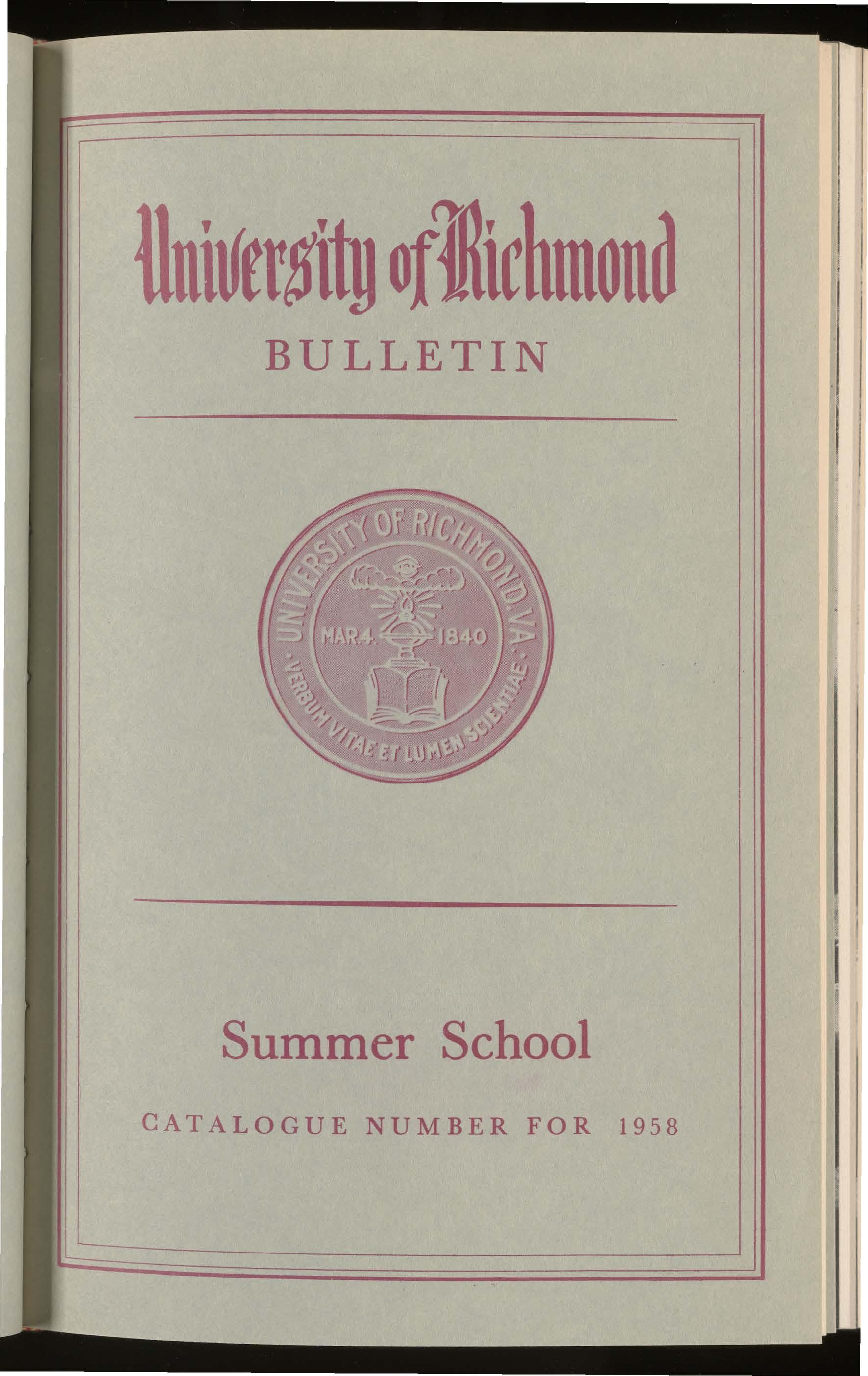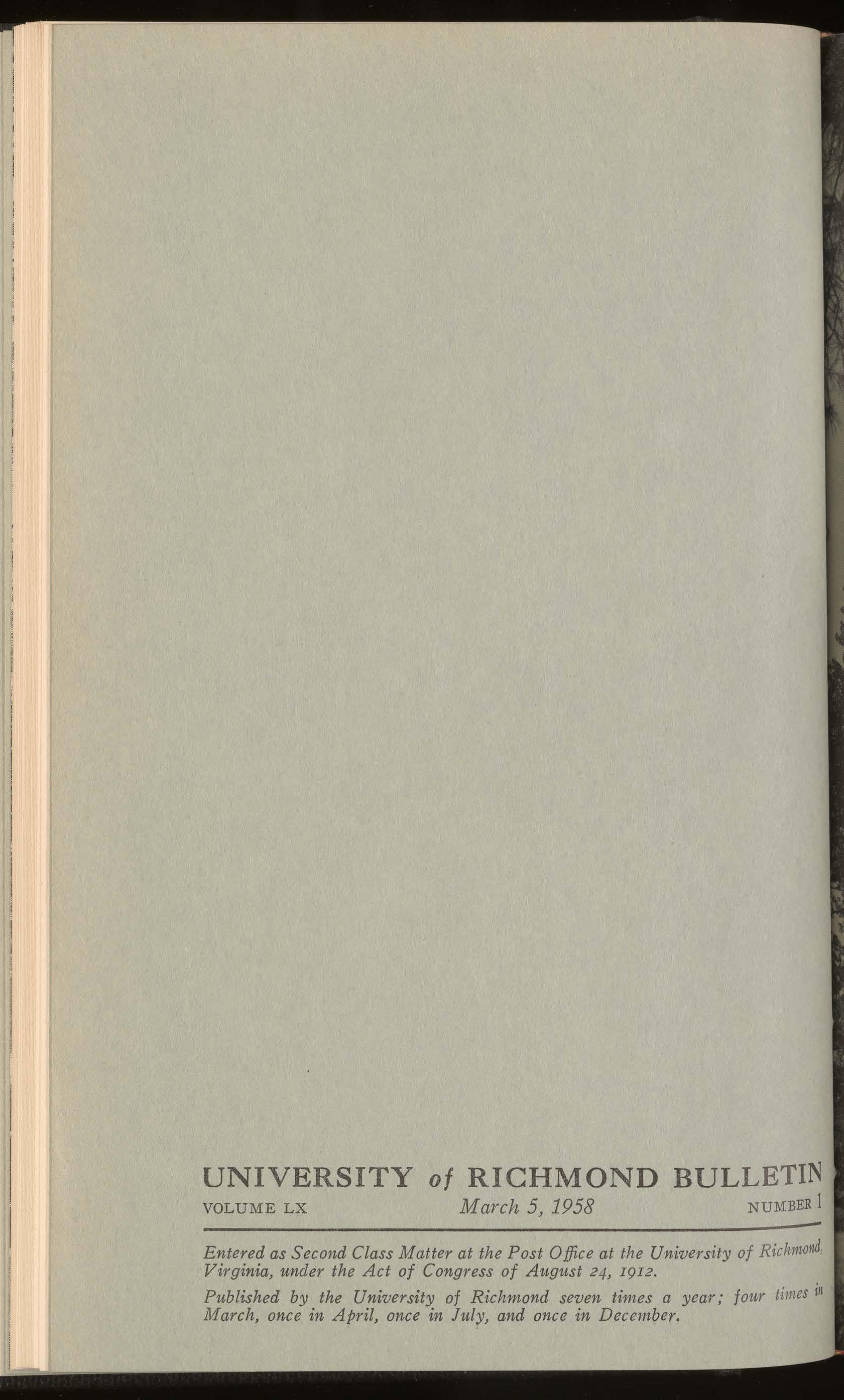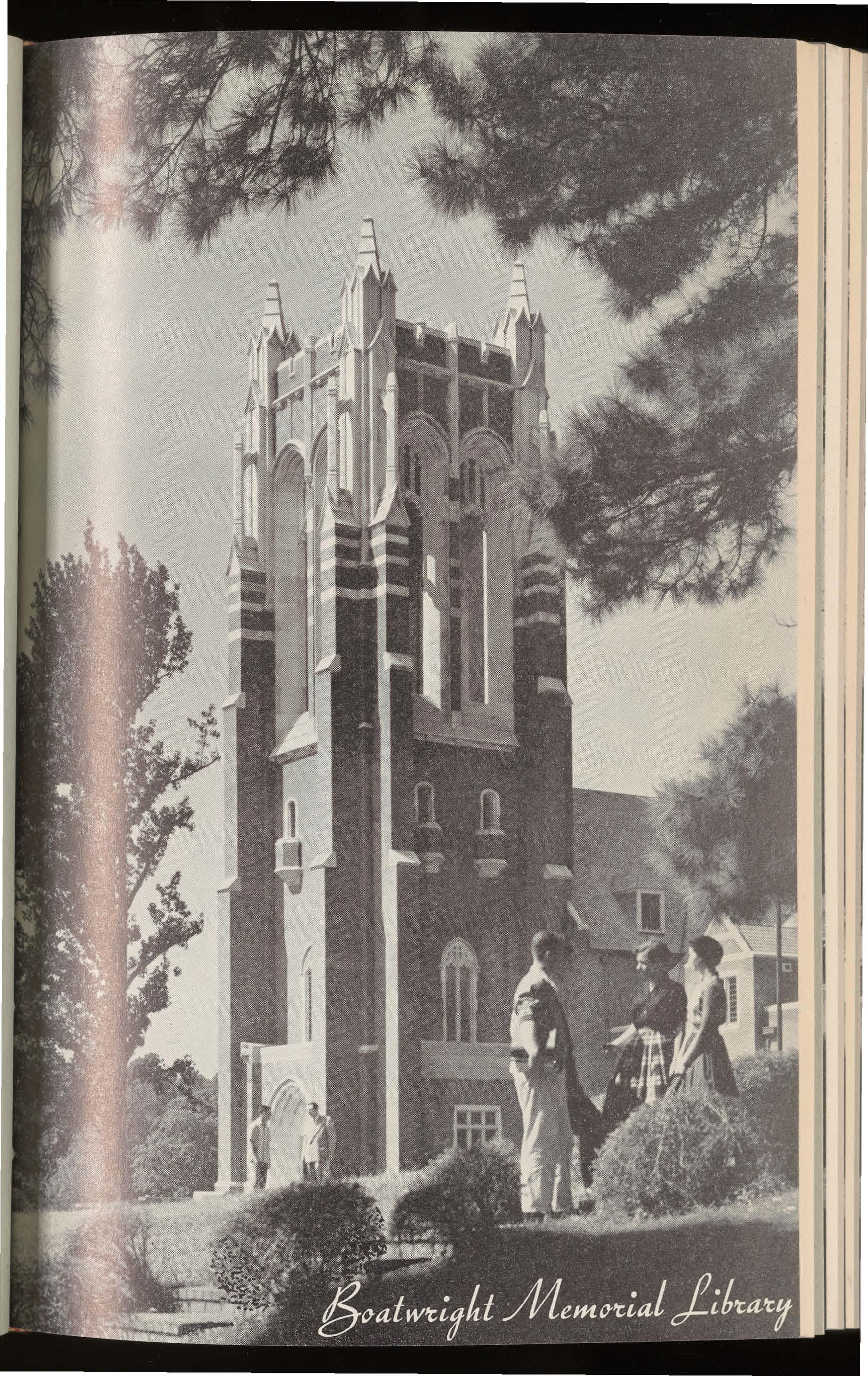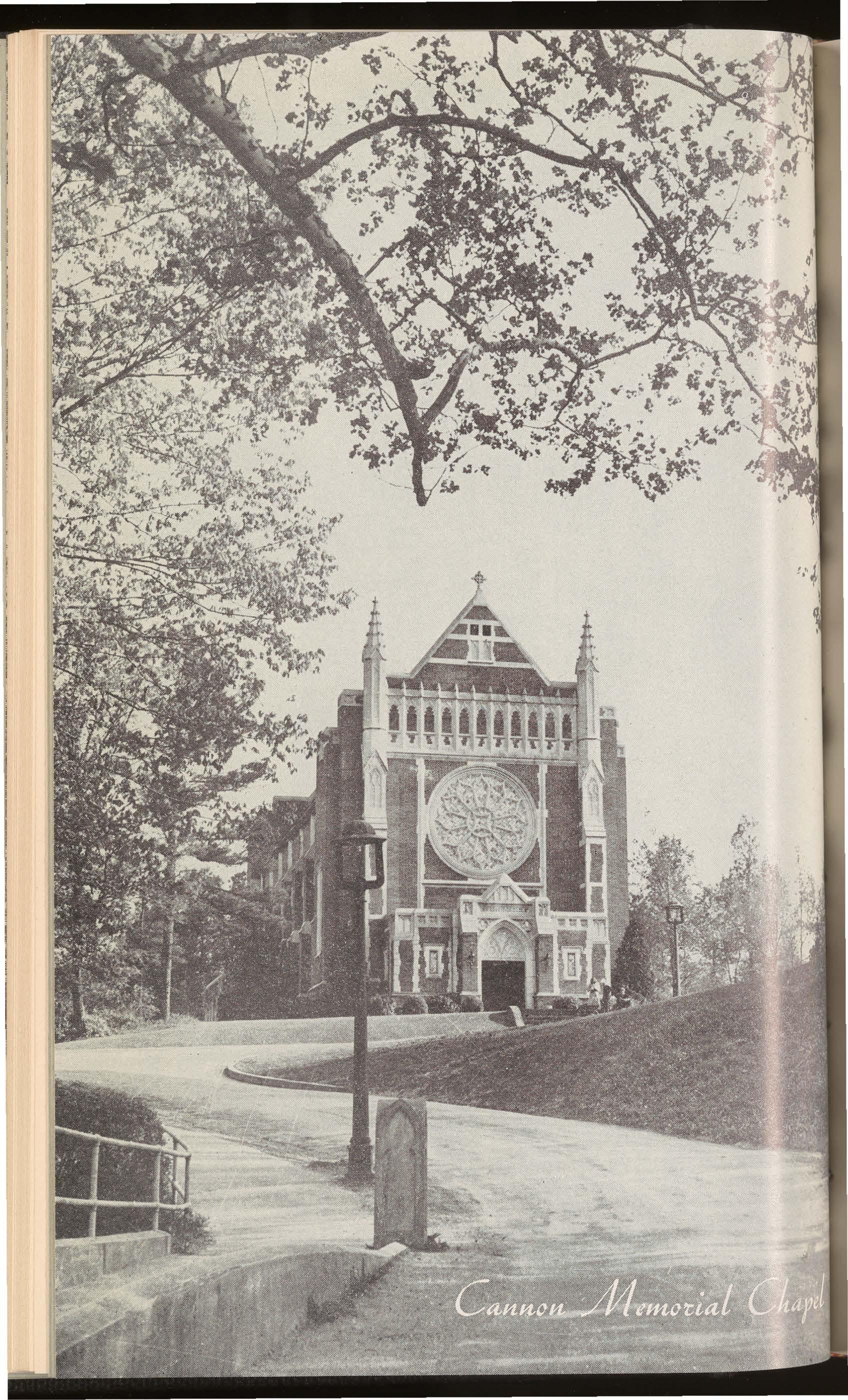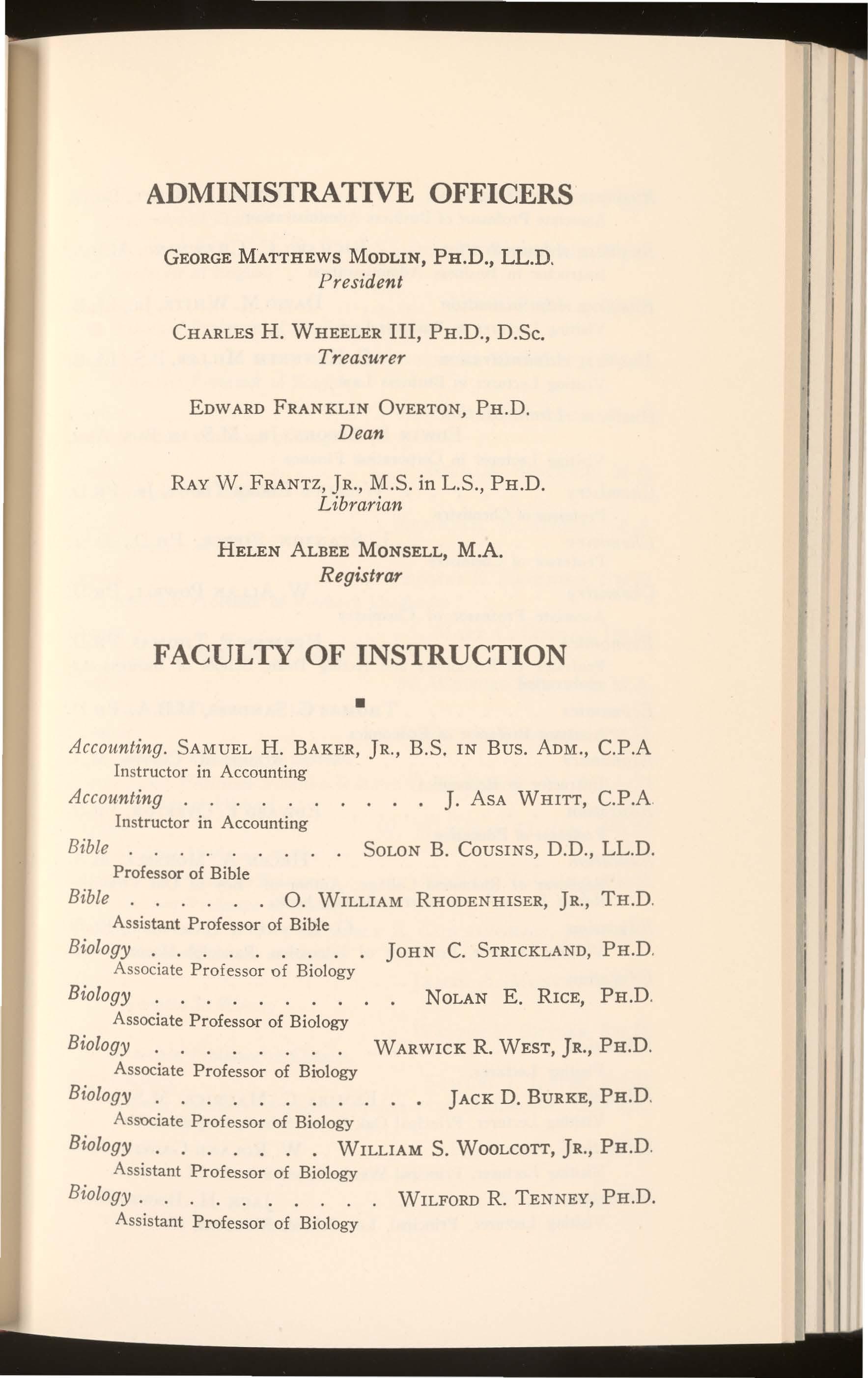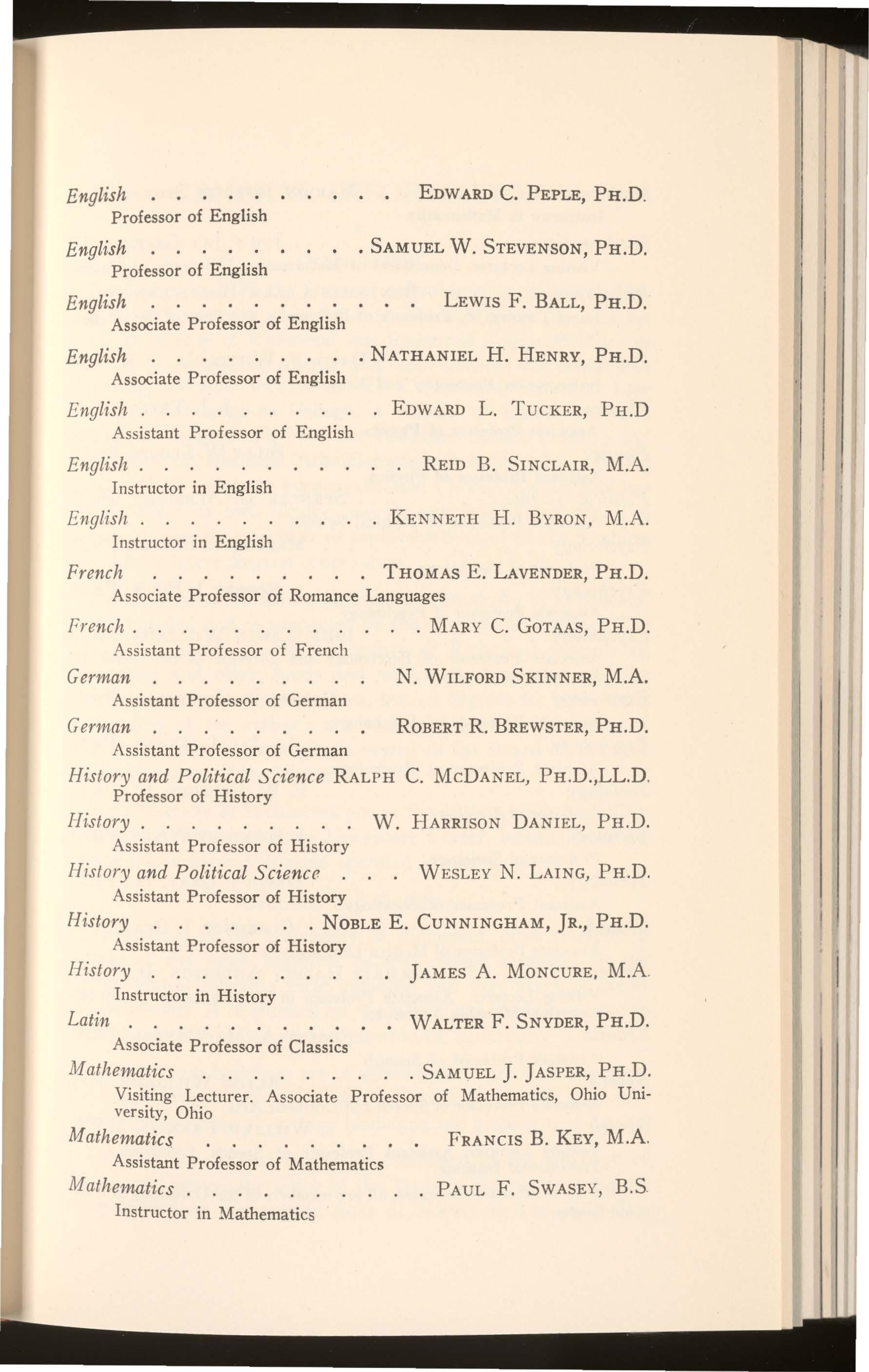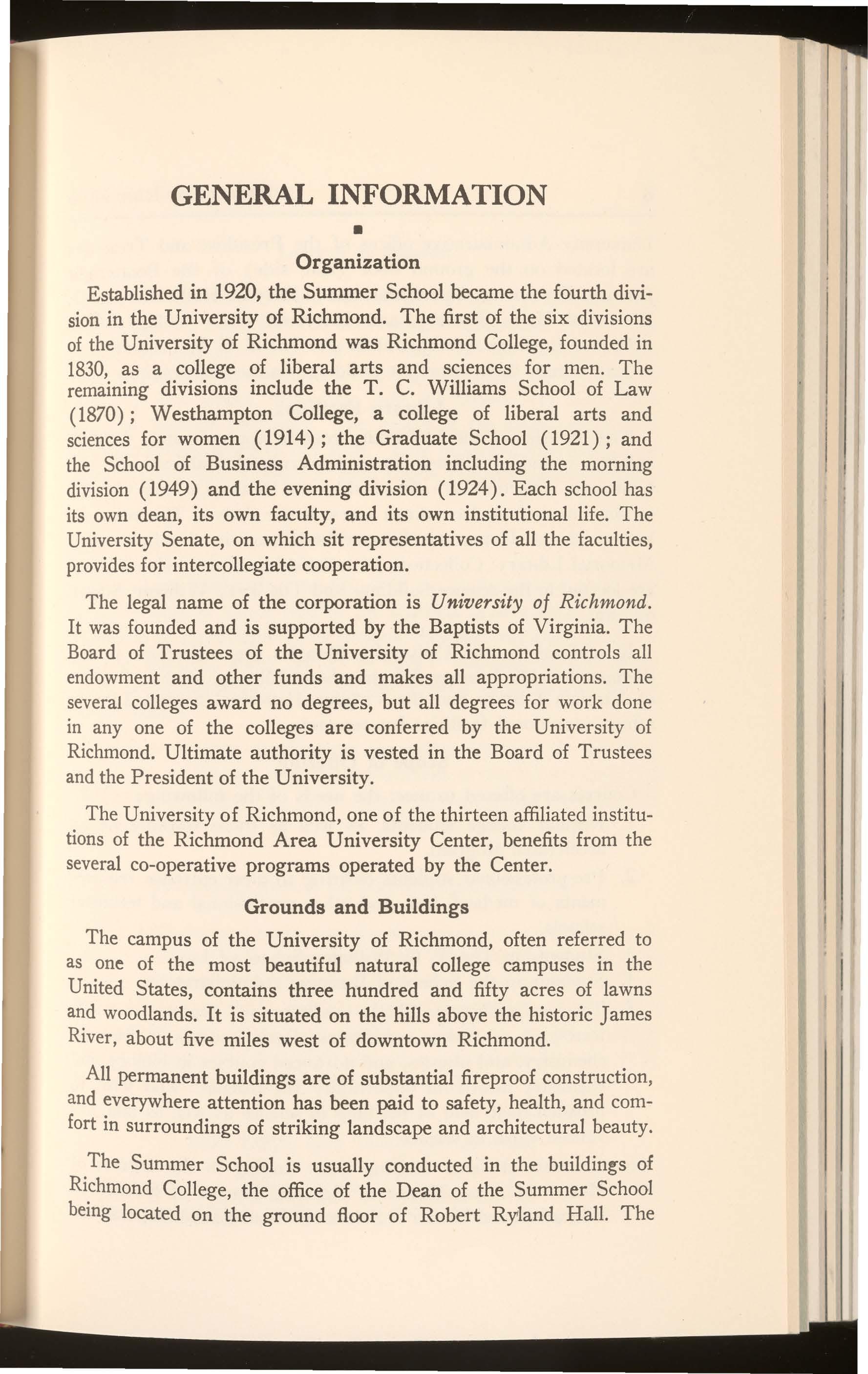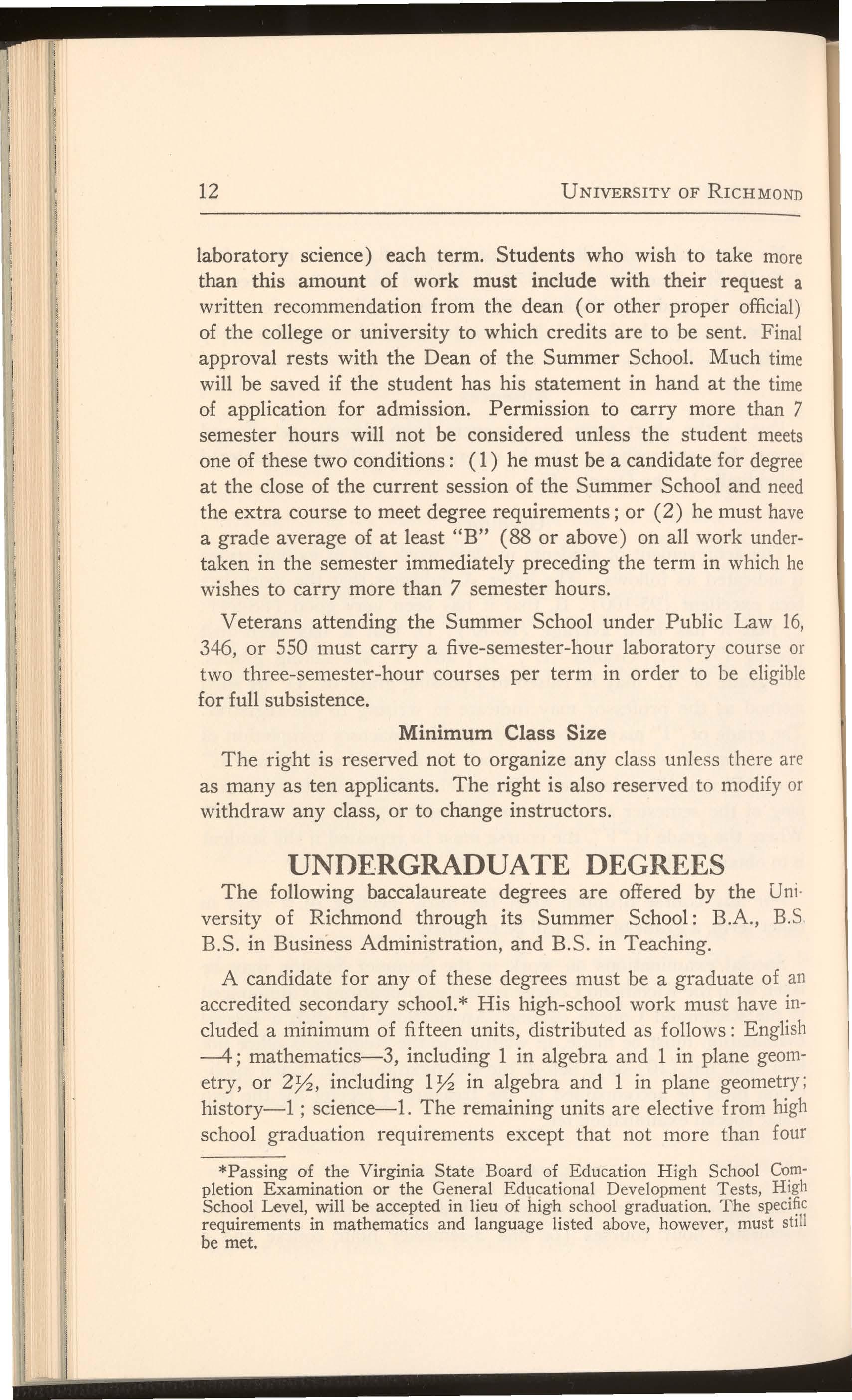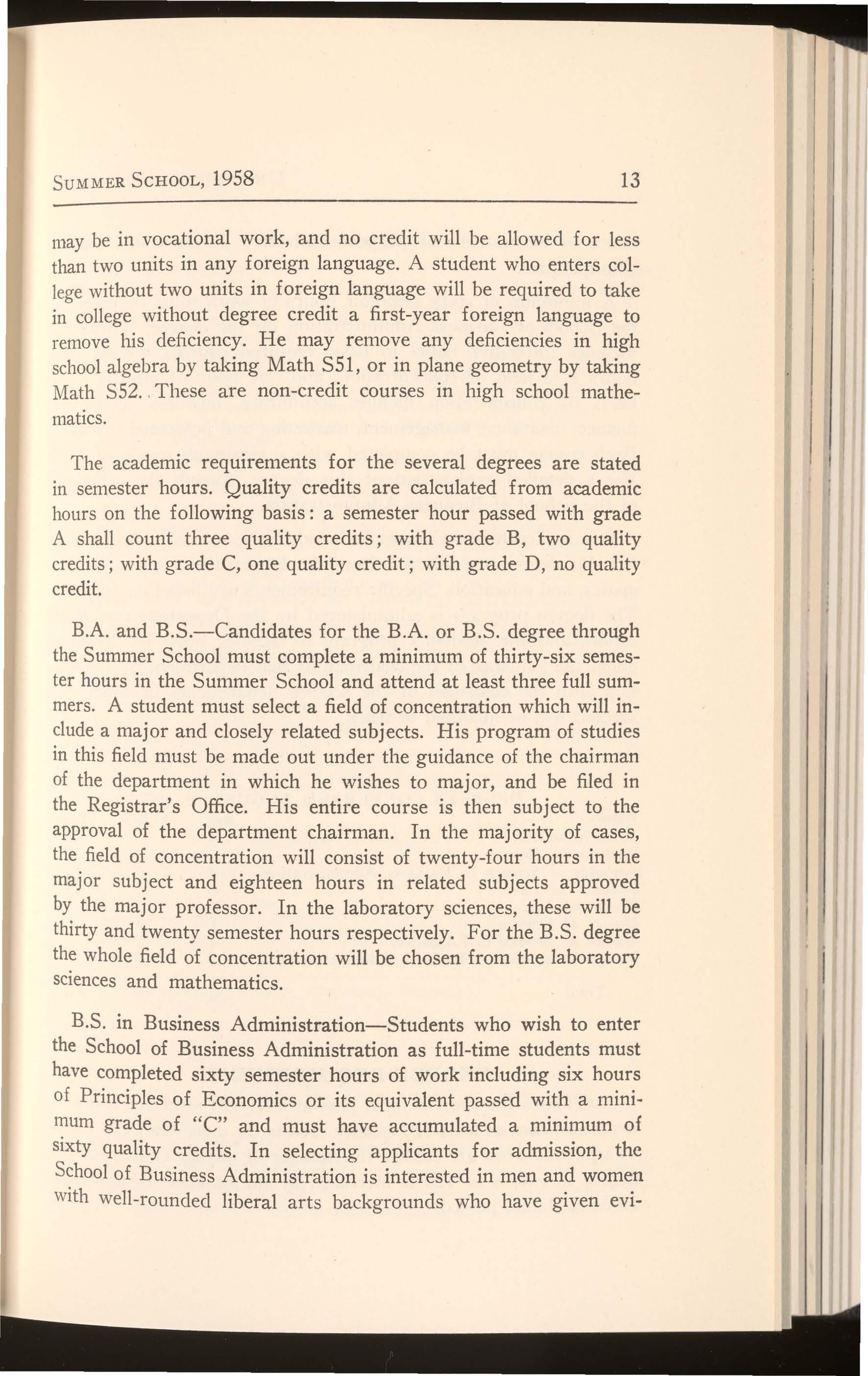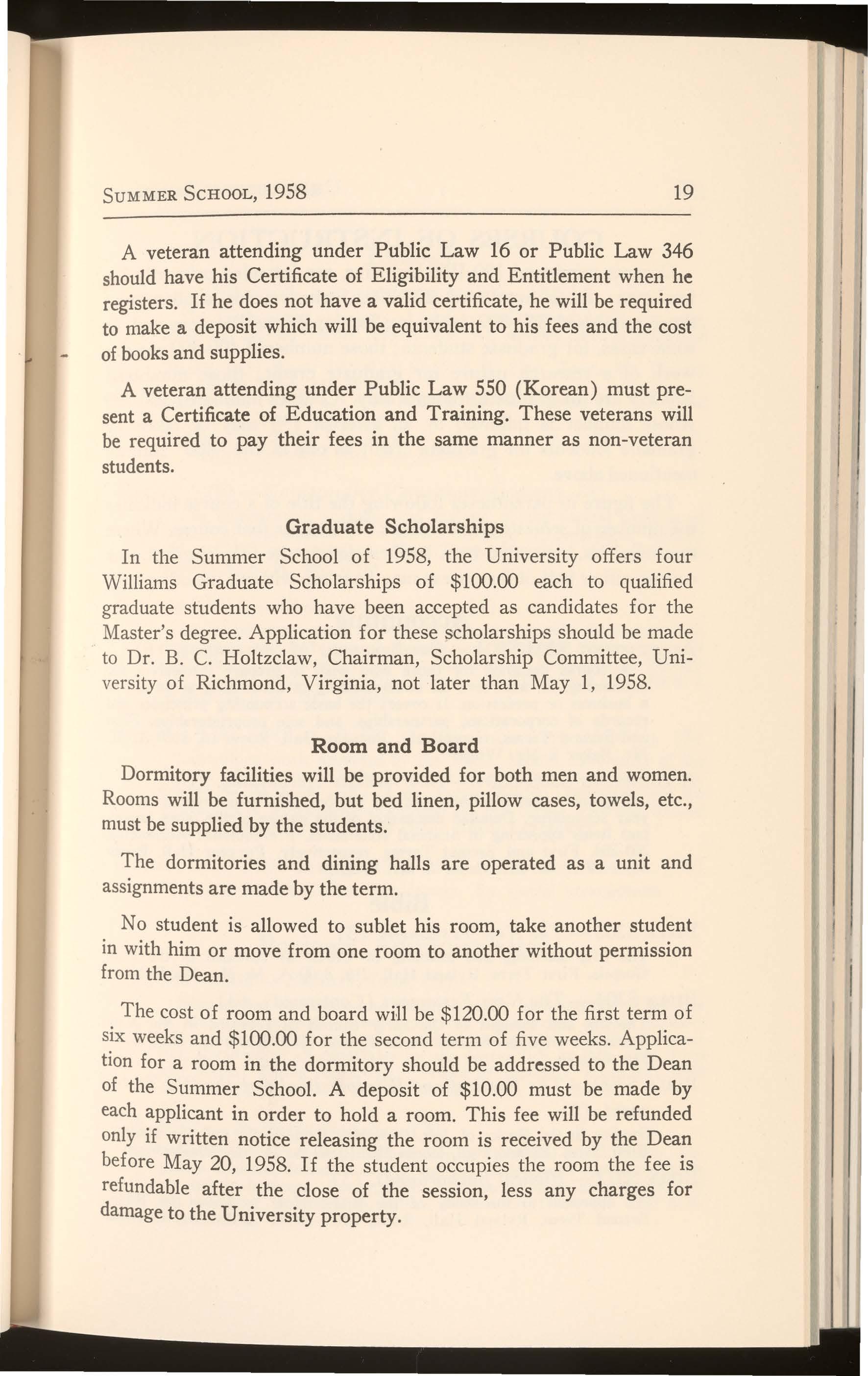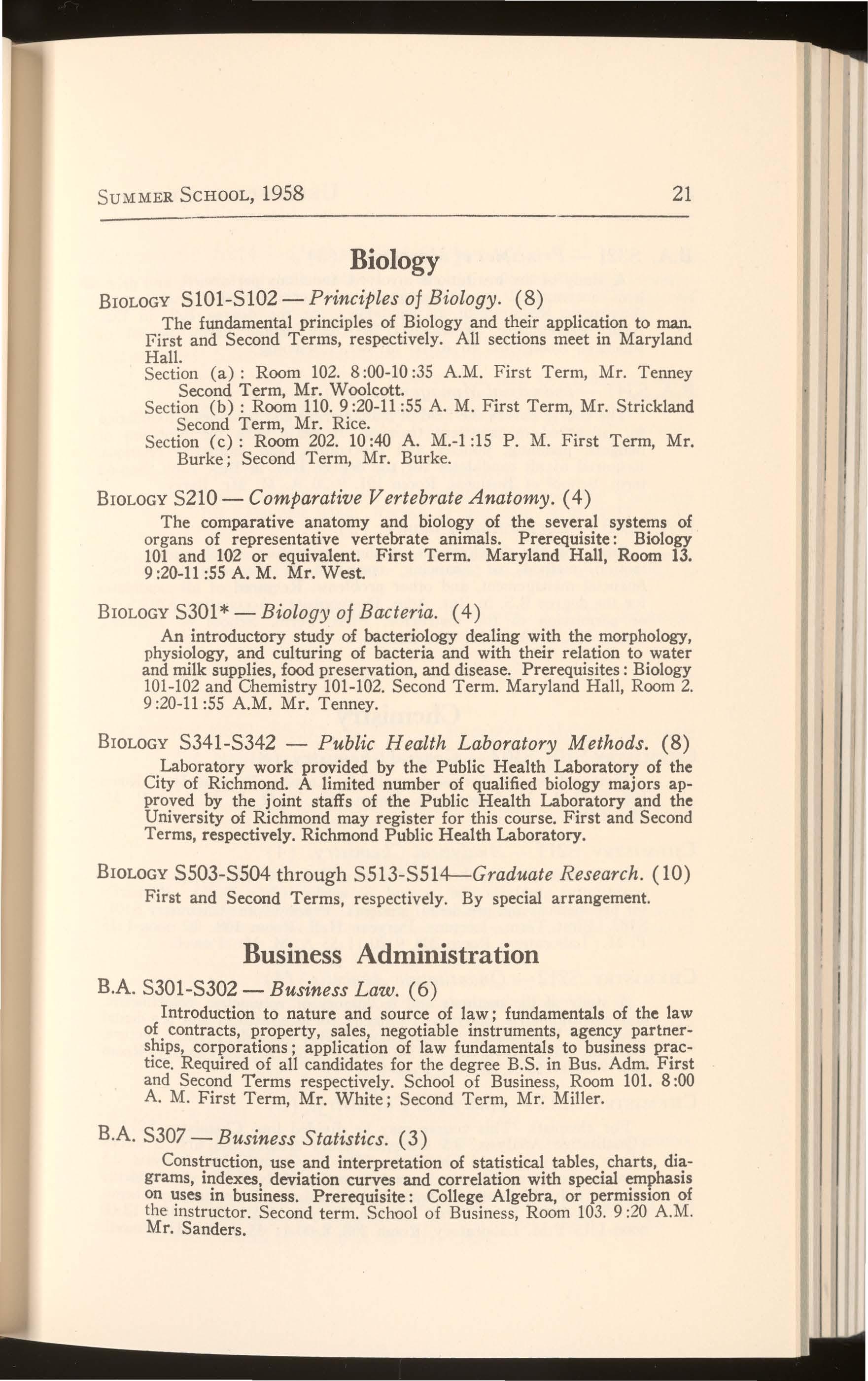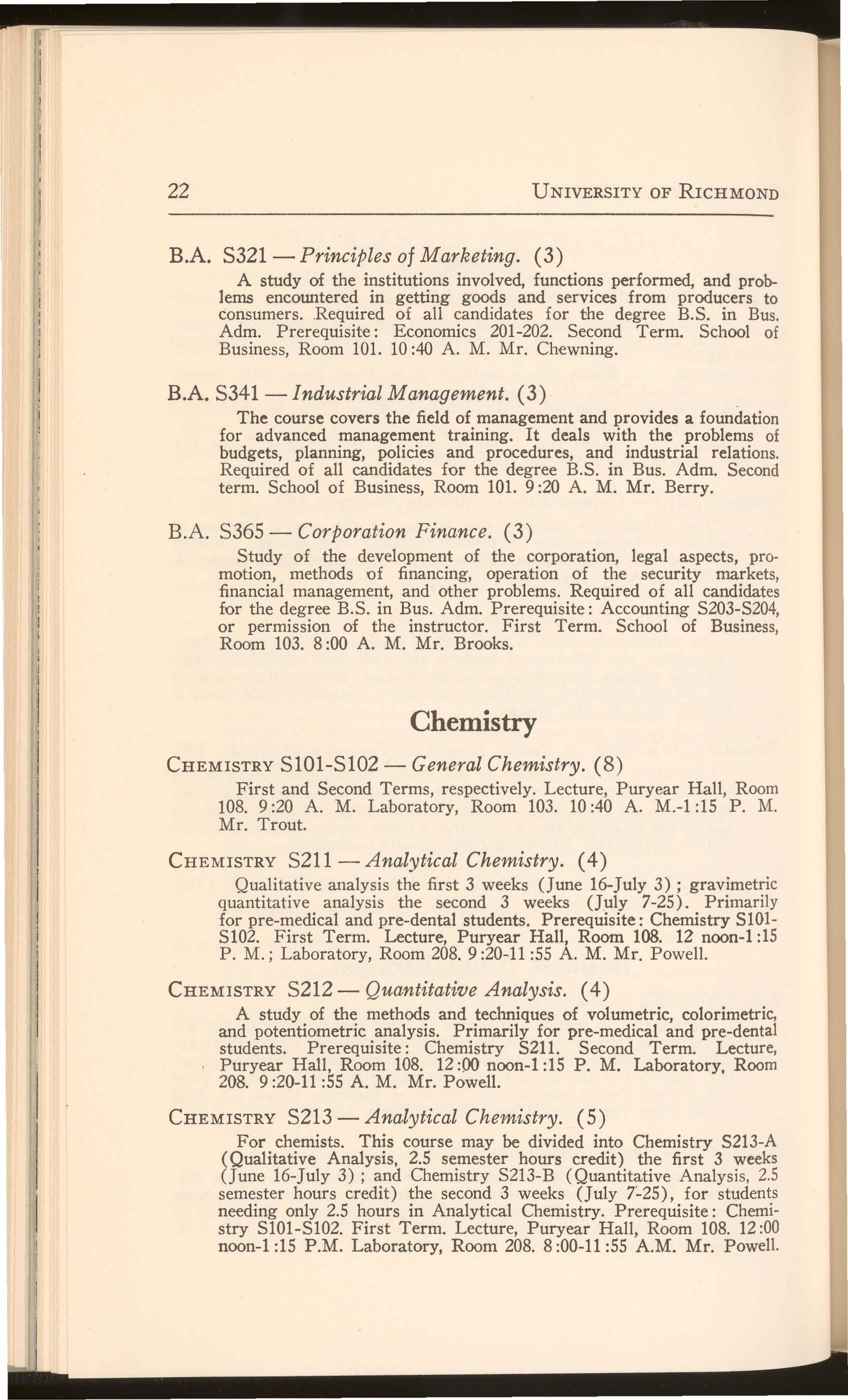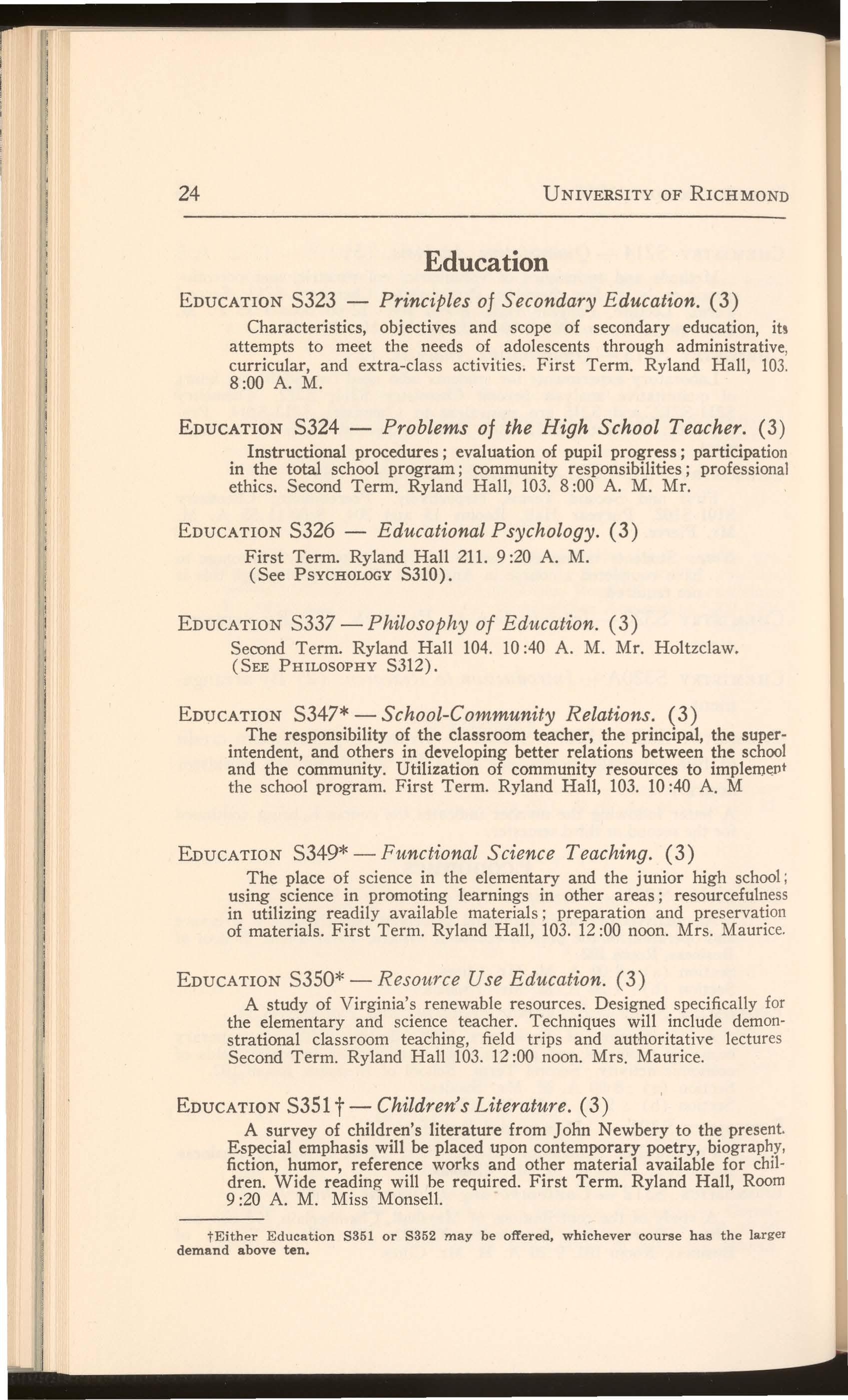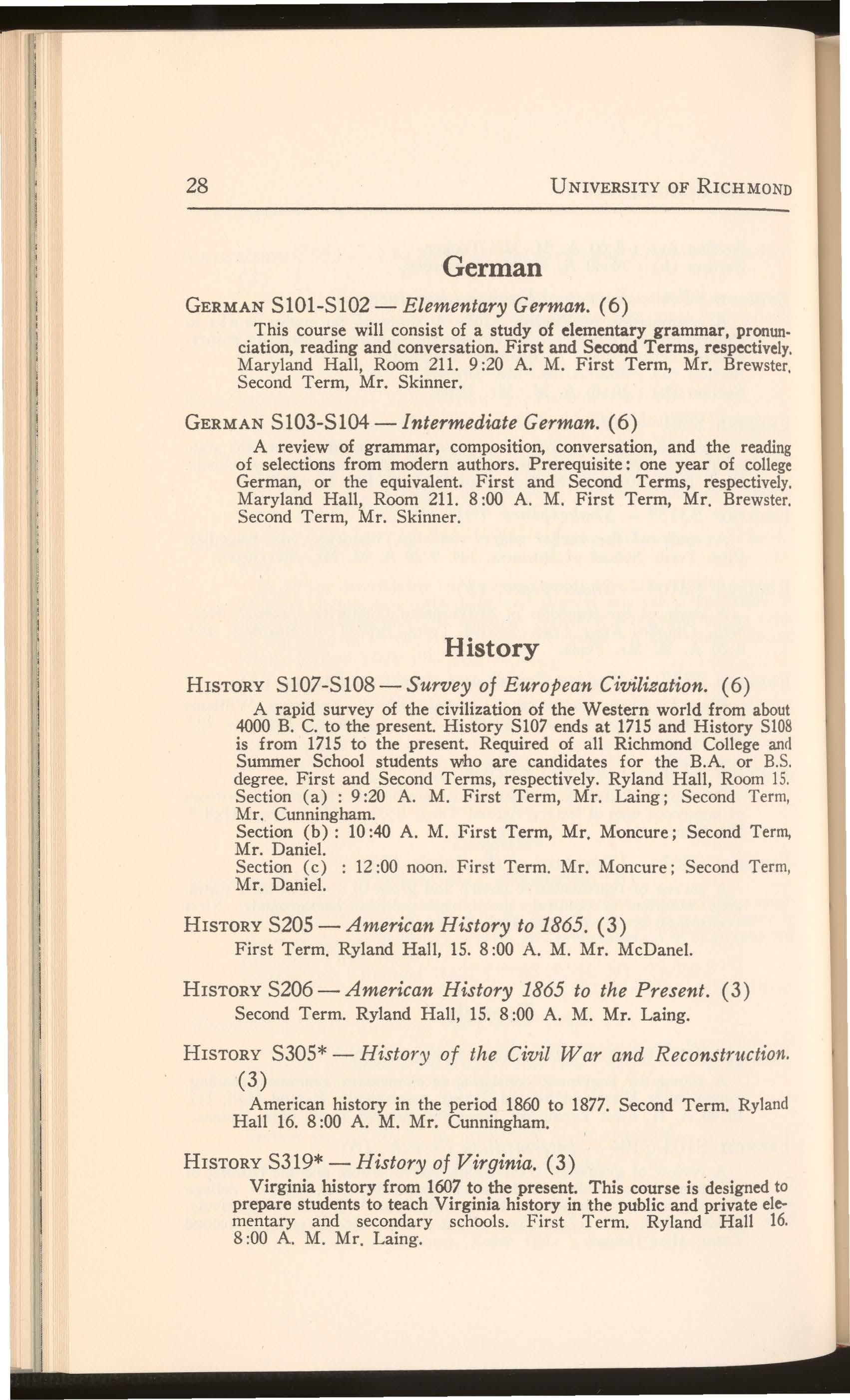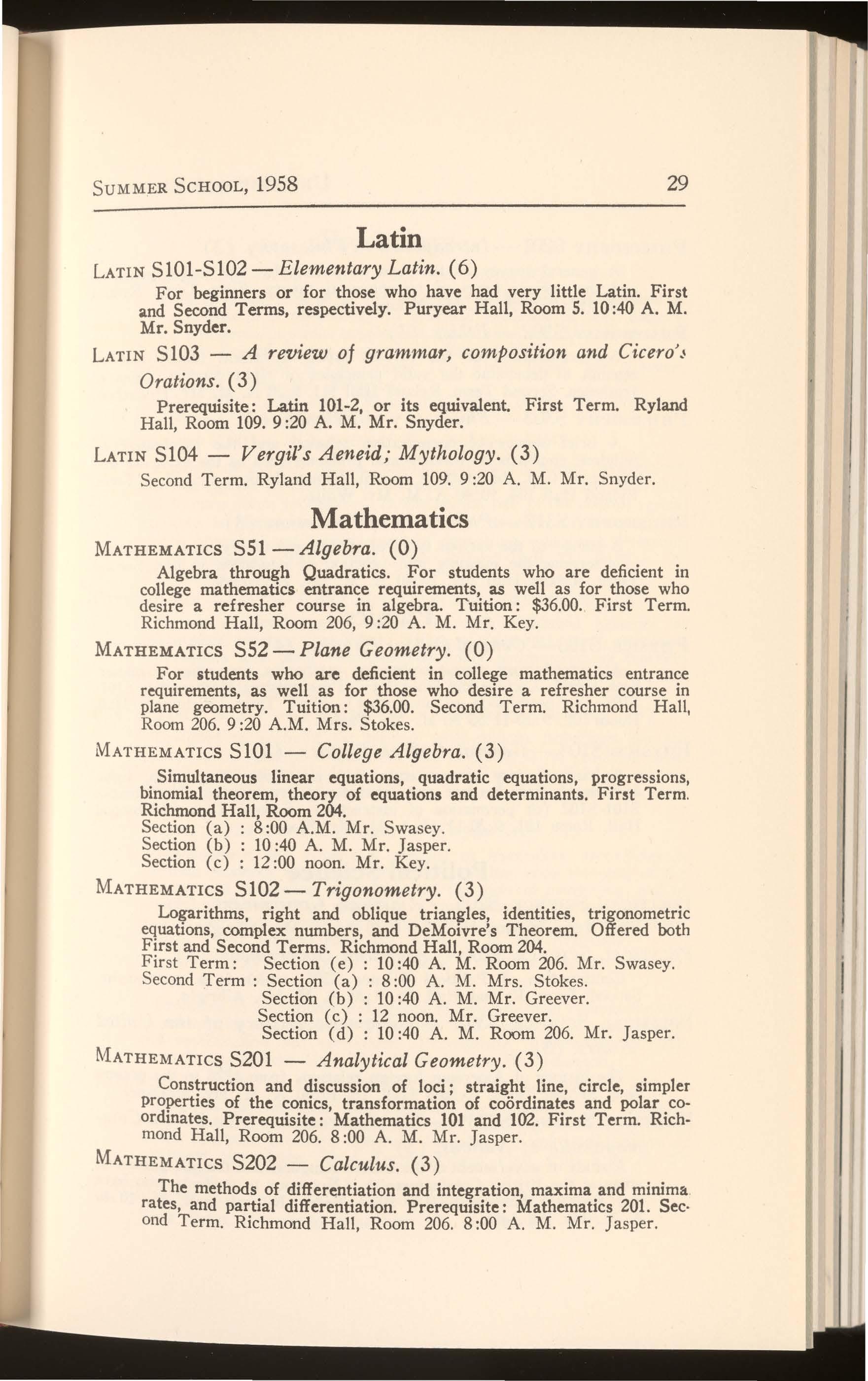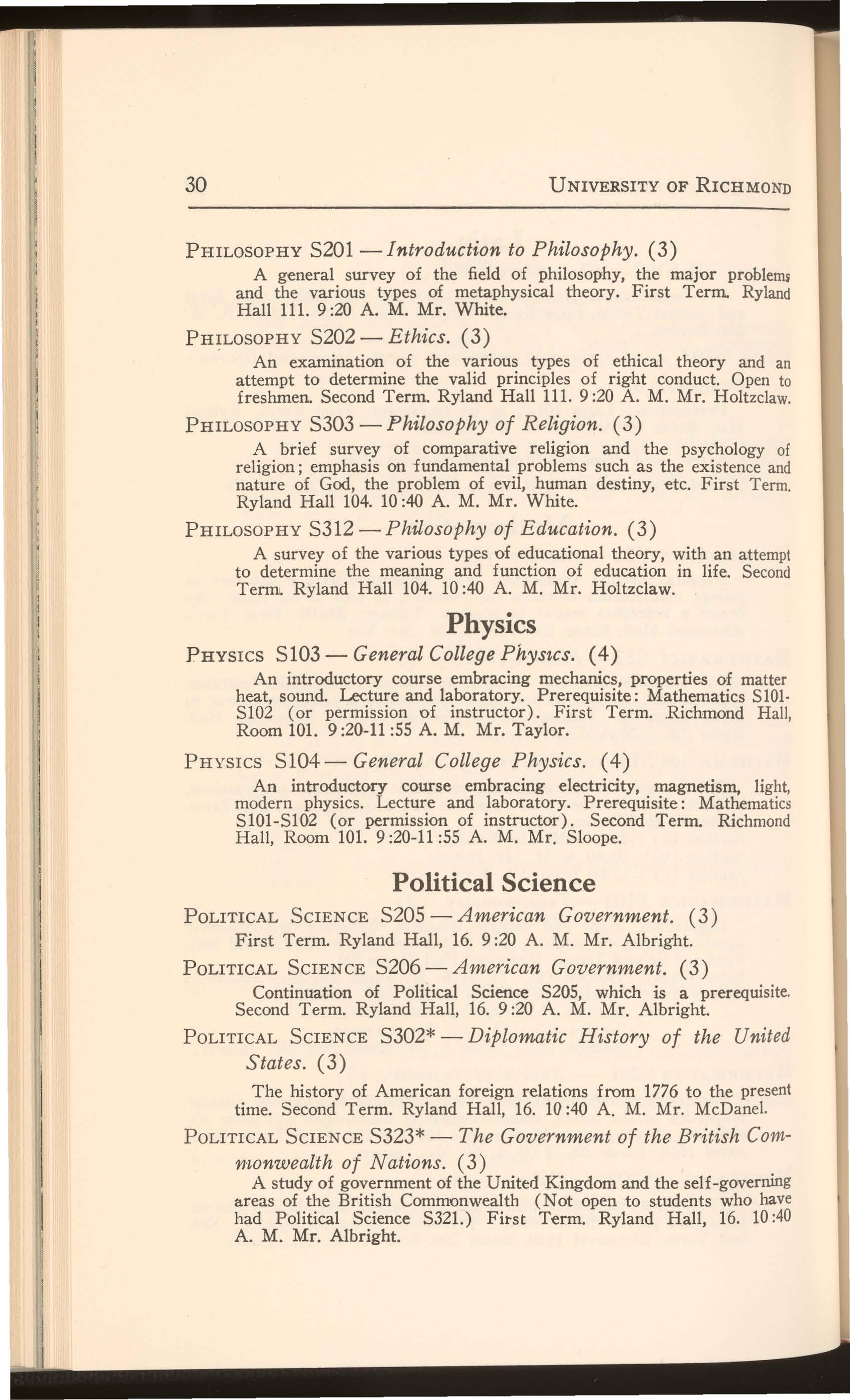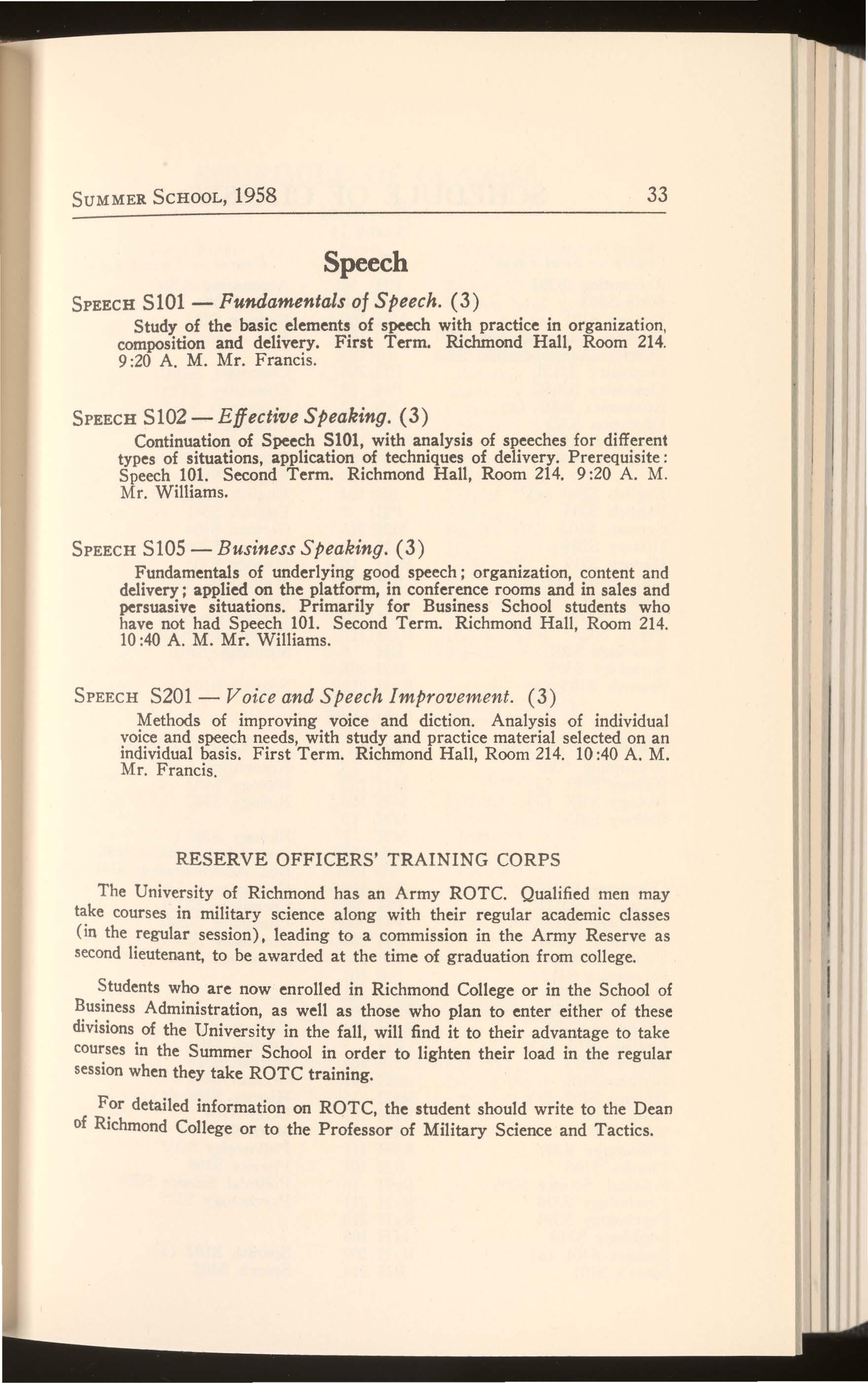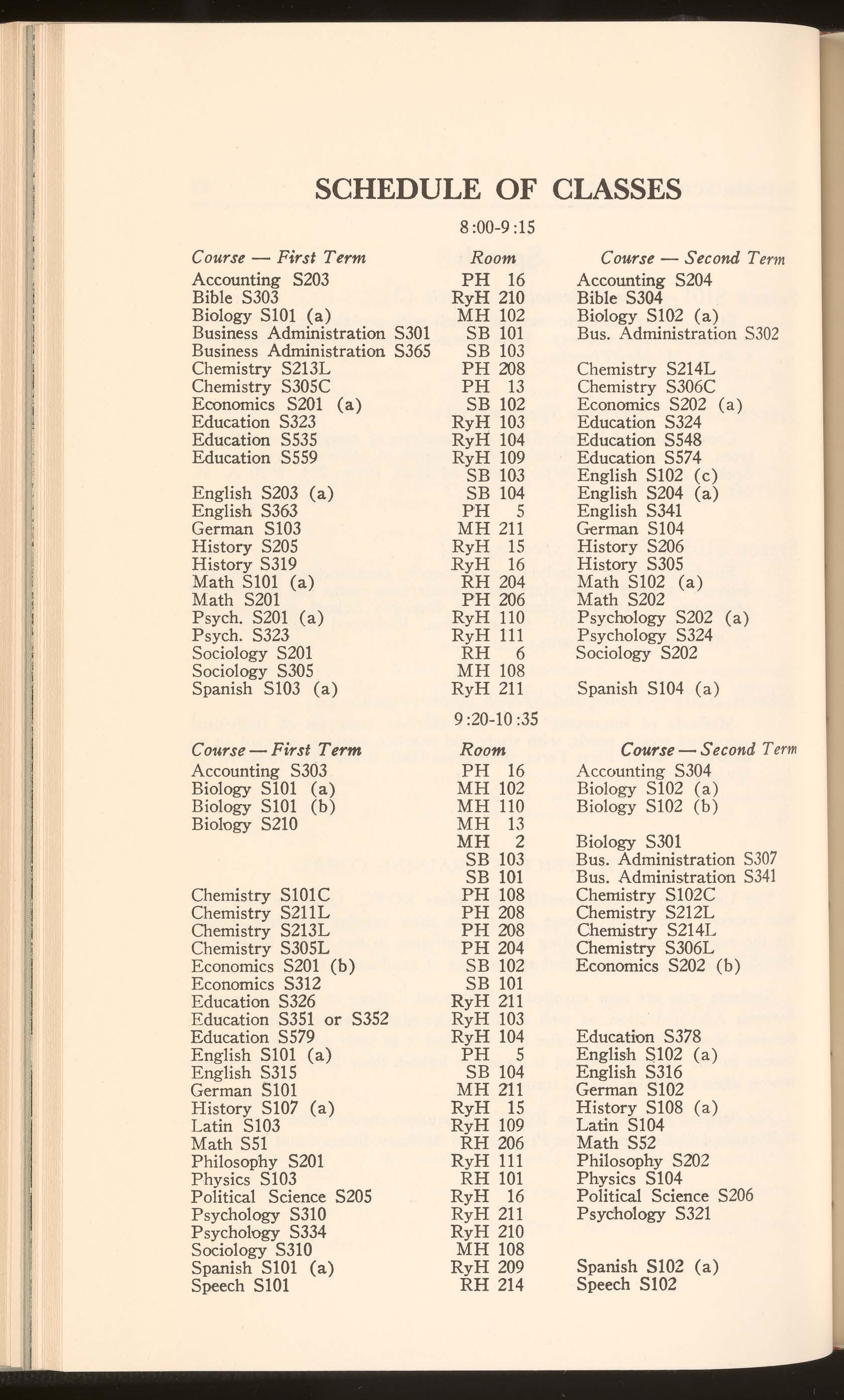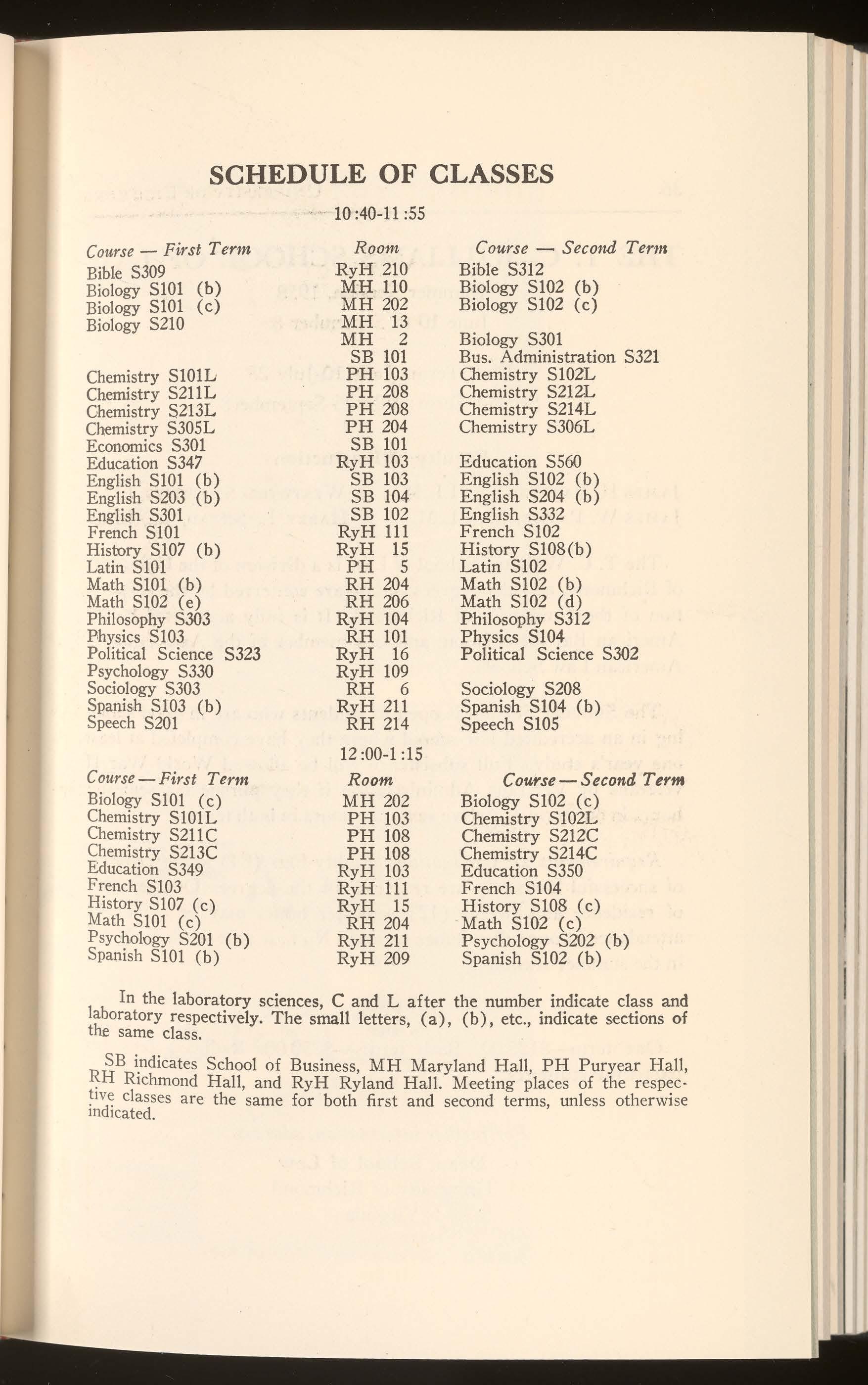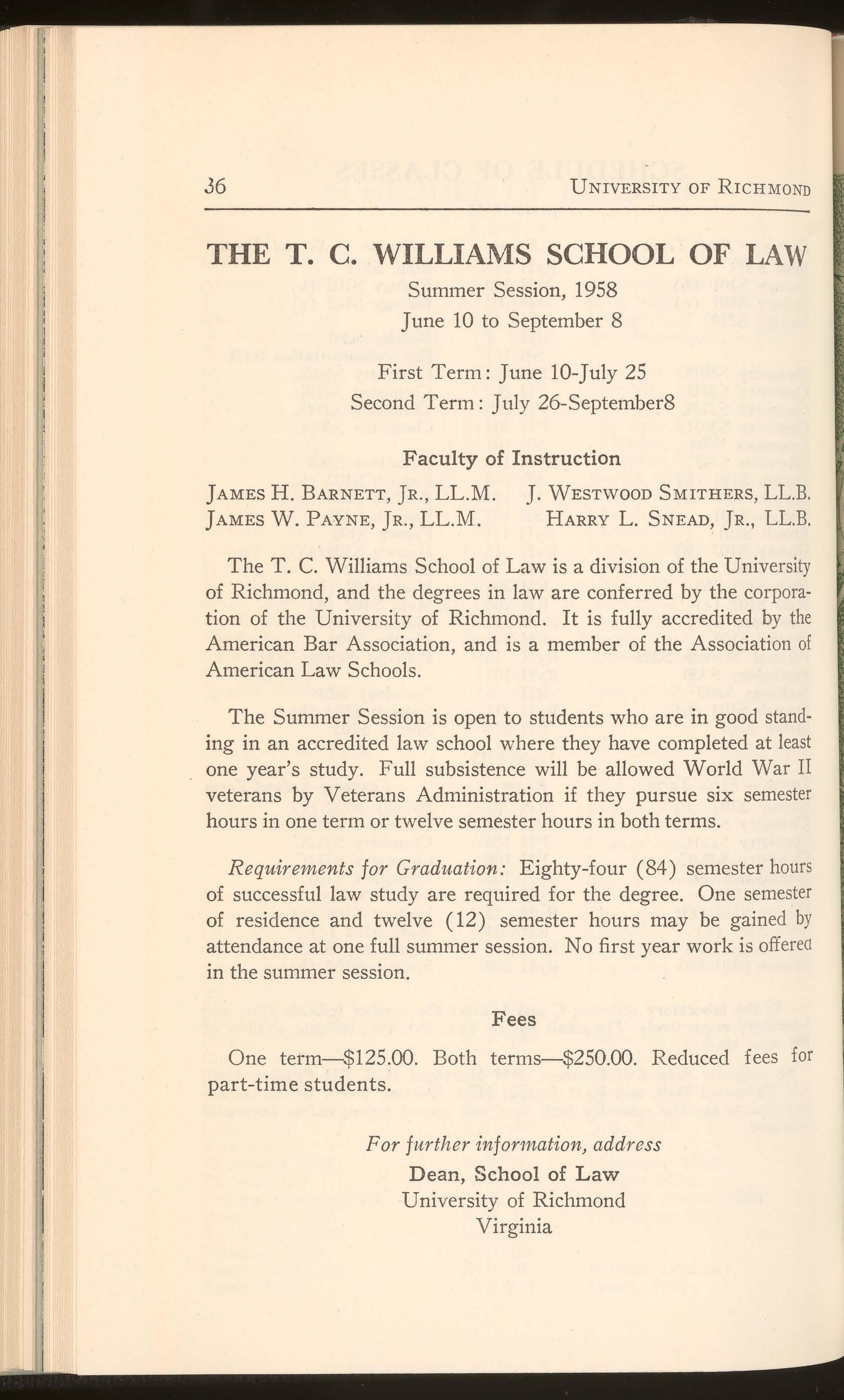Summer School
ELEVEN-WEEK SESSION
June 16 to August 29
First Term: June 16-July 25
Second Term: Jul y 26-August 29
UNIVERSITY of RICHMOND
VIRGINIA 1958
CALENDAR-1958
JUNE 16, MONDAY-Registration, 8 :30 A. M.-3 :30 P. M.
JUNE 17, TUESDAY-Classes begin at 8:00 A. M.
JUNE 18, WEDNESDAY-Last day to make any changes in classes. Applications for degrees filed with Registrar.
JuNE 19, THURSDAY-Opening convocation-Cannon Memorial Chapel, 10 :10-10 :SO A. M.
JuNE 21, SATURDAY-Classes meet to make up for registration day.
JUNE 28, SATURDAY-Classes meet to make up for Independence Day holiday.
JULY 4, FRIDAY-Holiday for Independence Day.
JULY 24 AND 25, THURSDAYAND FRIDAY-First-term examinations.
JULY 25, FRIDAY-First term ends.
JuLY 26, SATURDAY-Registration for second term, 8:30 A. M. to 12:00 noon .
JULY 28, MONDAY-Classes begin at 8 :00 A. M.
JULY 29, TUESDAY-Last day for changes in classes.
AUGUST 26 AND 27, TUESDAYAND WEDNESDAY-Examinations for degree candidates.
AUGUST28 AND29, THURSDAYAND FRIDAY-Second-term examinations.
AUGUST29, FRIDAY-Commencement.
1957 SUMMER SCHOOL ENROLLMENT
Number Enrolled Both Terms 1st Term Only 2nd Term Only Totals
ADMINISTRATIVE OFFICERS
GEORGEMATTHEWSMODLIN,PH.D., LL.D. President
CHARLESH. WHEELERIII, PH.D., D.Sc. Treasurer
EDWARDFRANKLIN OVERTON,PH.D . Dean
RAY W. FRANTZ,JR., M.S. in L.S., PH.D. Librarian
HELEN ALBEE MoNSELL, M.A. Registrar
FACULTY OF INSTRUCTION
•
Accounting. SAMUELH . BAKER, JR., B.S. IN Bus. ADM. , C.P .A
In struct o r in Accounting
Accounting . In structor in Accounting
Bible
Professor of Bible
Bi ble
J. AsA WHITT, C.P.A
SOLONB. COUSINS , D.D ., LL.D .
0. WILLIAM RHODENHISER,JR., TH.D.
Assistant Professor of Bible
Bi ology . . . . . . . .
Associa t e Pro f essor of Biology
Biology
Associate Professor of Biology
Biology
Associate Professor of Biology
Biology
Associate Professor of Biology
Biology
JOHN C, STRICKLAND,PH.D.
NOLAN E. RICE, PH.D .
WARWICKR. WEST, JR., PH.D
JACK D. BURKE,PH.D .
WILLIAM S. WooLCOTT,JR., PH.D
Ass istant Professor of Biology
Biology
Assistant Professor of Biology
WILFORDR. TENNEY,PH.D.
Business Administration
THOMAS S. BERRY, PH.D.
Associate Professor of Business Administration
Business Administration
RICHARD C. CHEWNING, M B.A. Instructor in Business Administration
Business Administration
DAVID M. WHITE, JR., LL.B Visiting Lecturer in Business Law
Business Administration
• G. KENNETH MILLER, B.S., LL.B Visiting Lecturer in Business Law
Business Administration
EDWIN B. BROOKS, JR., M.S. IN Bus. AnM
Visiting Lecturer in Corporation Finance
Chemistry
• WILLIAM EDGAR TROUT, JR., PH.D . Professor of Chemistry
Chemistry
J. STANTON PIERCE, PH.D., D.Sc. Professor of Chemistry
Chemistry
Associate Professor of Chemistry
Economics
. W. ALLAN POWELL, PH.D.
HERMAN P. THOMAS, PH.D
Professor of Economics and :Acting Dean, School of Business Ad· ministration
Economics
• THOMAS C. SANDERS, M.B.A., PH D, Assistant Professor of Economics
Economics
Instructor in Economics
Education
Professor of Education
Education
ROGER M. CLITES, M.A
EDWARD F. OVERTON, PH.D,
• HELEN A. MONSELL, M.A. Registrar of Richmond College; Author of "Boy of Old VirginiaRobert E Lee" and other children's books
Education 0. KENNETH CAMPBELL, En.D Visiting Lecturer, Professor of Education, Randolph-Macon College
Education
Education . Visiting Lecturer,
Education . ELMIRA C. MAURICE, M.S. in En. Visiting Lecturer, Principal Oak Grove School, Richmond, Va.
Education W. ROLAND GALVIN, M A. Visiting Lecturer, Principal Westhampton School
Education . JACK H. BOGER, En.D. Visiting Lecturer, Principal, Lee School, Richmond, Va.
English
EDWARD C. PEPLE, PH.D. Professor of English
English
• SAMUEL W. STEVENSON, PH.D. Professor of English
English
Associate Professor of English
English
Associate Professor of English
English
Assistant Professor of English
English .
Instructor in English
English .
LEWIS F. BALL, PH.D.
• NATHANIEL H. HENRY, PH.D.
EDWARD L. TucKER, PH.D
REID B. SINCLAIR, M.A.
KENNETH H. BYRON, M.A. Instructor in English
French
THOMAS E. LAVENDER, PH.D.
Associate Professor of Romance Languages
French.
Assistant Professor of French German
Assistant Professor of German German
Assistant Professor of German
History and Political Science
MARY C. GoTAAS, PH.D.
N. WILFORD SKINNER, M.A.
ROBERT R. BREWSTER, PH.D.
RALPH C. McDANEL, PH.D.,LL.D Professor of History
History . W. HARRISON DANIEL, PH.D.
Assistant Professor of History
History and Political Science
Assistant Professor of History
History
WESLEY N. LAING, PH.D.
NOBLE E. CUNNINGHAM, JR., PH.D.
Assistant Professor of History
History
JAMES A. MONCURE, M.A. Instructor in History
Latin . Associate Professor of Classics
Mathematics
WALTER F. SNYDER, PH.D.
. SAMUEL J. JASPER, PH.D.
Visiting Lecturer. Associate Professor of Mathematics, Ohio University, Ohio
Mathematics.
Assistant Professor of Mathematics
Mathematics
Instructor in Mathematics
FRANCIS B. KEY, M.A.
PAUL F. SWASEY, B.S
Mathematics Instructor in Mathematics
Mathematics .
MARION JEFFRIES STOKES, M.A.
• JOHN JAY GREEVER, III
Visiting Lecturer. Department of Mathematics, University of Virginia
Philosophy . BENJAMIN CLARK HoLTZCLAW, PH.D. James Thomas, Jr., Professor of Philosophy, and Dean of the Graduate School
Philosophy . Instructor in DAVID F. WHITE, JR., A.B., B.D, Philosophy and Religion
Physics • J. J. TAYLOR, M.S . Associate Professor of Physics
Physics BILLY w. SLOOPE, PH.D, Assistant Professor of Physics
Political Science . . SPENCER D. ALBRIGHT, PH.D. Associate Professor of Political Science
Psychology
MERTON E. CARVER, PH D. Professor of Psychology
Psychology . . ROBERT J. FILER, PH.D. Associate Professor of Psychology
Psychology . . JOHN EDWIN WILLIAMS, PH.D.
Associate Professor of Psychology and Director of the Center for Psychological Services
Psychology . ROBERT A. JOHNSTON, PH D. Assistant Professor of Psychology
Psychology . JAY L. CLARK, PH.D. Assistant Professor of Psychology
Sociology
E.W. GREGORY, JR , PH.D. Professor of Sociology
Sociology J. HUNDLEY WILEY, PH.D. Professor of Sociology
Sociology . DAVID J. GRAY, JR., PH.D. Assistant Professor of Sociology
Spanish CLARENCE J. GRAY, A.M. Associate Professor of Modern Languages
Spanish
EMMETT HARVEY ANDERSON, JR , PH.D
Visiting Lecturer. Associate Professor of Modem Languages, South· western at Memphis,Tennessee.
Spanish
ROBERT A. MACDONALD, PH.D. Assistant Professor of Spanish
Speech . ALTON WILLIAMS, M.A.
Associate Professor of Speech and Dramatic Arts
Speech . . WILLIAM FRANCIS, M.F.A.
Visiting Lecturer. Assistant Professor of Speech, Richmond Professional Institute.
Except as otherwise indicated, all are members of the University of Rich· mond faculty.
GENERAL INFORMATION •
Organization
Established in 1920, the Summer School became the fourth division in the University of Richmond. The first of the six divisions of the University of Richmond was Richmond College, founded in 1830, as a college of liberal arts and sciences for men. The remaining divisions include the T. C. Williams School of Law (1870); Westhampton College, a college of liberal arts and sciences for women ( 1914) ; the Graduate School ( 1921) ; and the School of Business Administration including the morning division (1949) and the evening division (1924). Each school has its own dean, its own faculty, and its own institutional life. The University Senate, on which sit representatives of all the faculties, provides for intercollegiate cooperation.
The legal name of the corporation is University of Richmond. It was founded and is supported by the Baptists of Virginia. The Board of Trustees of the University of Richmond controls all endowment and other funds and makes all appropriations. The several colleges award no degrees, but all degrees for work done in any one of the colleges are conferred by the University of Richmond. Ultimate authority is vested in the Board of Trustees and the President of the University.
The University of Richmond, one of the thirteen affiliated institutions of the Richmond Area University Center, benefits from the several co-operative programs operated by the Center.
Grounds and Buildings
The campus of the University of Richmond, often referred to as one of the most beautiful natural college campuses in the United States, contains three hundred and fifty acres of lawns and woodlands. It is situated on the hills above the historic James River, about five miles west of downtown Richmond.
All permanent buildings are of substantial fireproof construction, and everywhere attention has been paid to safety, health, and comfort in surroundings of striking landscape and architectural beauty .
The Summer School is usually conducted in the buildings of Richmond College, the office of the Dean of the Summer School being located on the ground floor of Robert Ryland Hall. The
University Administrative offices of the President and Treasurer are located on the ground floor (lake side) of the Boatwright Library. The science departments are in Puryear Hall (chemistry), Richmond Hall (physics), and Maryland Hall (biology). The School of Business Administration and The T. C. Williams School of Law occupy their respective buildings on the main campus.
Library Facilities
The libraries of the University contain approximately 125,000 volumes including United States Government Publications. The University col1lections are classified by the Dewey Decimal Classification, and students have direct access to the shelves. The main collection of the University Library is housed in the Boatwright Memorial Library. Collections of technical and professional books are located in the science buildings and The T C. Williams School of Law.
In addition to the University libraries the collections in the Richmond Public Library, Virginia State Library, Medical College of Virginia Library and the Virginia Historical Society Library afford exceptional facilities for research.
Scope of Offering
Courses are offered to meet the needs of the following :
1. Regular college students, as well as those working on an accelerated program.
2. Pre-professional students desiring to meet entrance requirements of medical, law, and other professional and technical schools.
3. Students in The T. C. Williams School of Law.
4. Students in the School of Business Administration.
5. Teachers wishing to obtain credit toward degrees or certificates, or to renew certificates. Basic courses in biology, chemistry, and physics, and advanced courses in biology and chemistry afford an opportunity for teachers who wish to broaden their field of teaching in science as well as take ,advanced work in science.
6. Graduate students desiring work leading to the degrees of Master of Arts, M'aster of Science, Master of Science in Education, and Master of Science in Business Administration.
Length of Session
The 1958 Summer Session will extend through a period of eleven weeks. In the First Term of six weeks, which extends from June 16through July 25, classes will meet daily Monday through Friday with the exceptions stated in the College Calendar. In the Second Term of five weeks, beginning July 26, classes will meet daily Monday through Saturday. The length of the class periods will be seventy-five minutes net time. This program will enable one to earn a semester's credit in each course taken for either term.
The Honor Code
One of the outstanding traditions of the University of Richmond is the concept of honor held by the students in its several colleges. Breaches of the Honor Code include cheating, violation of signed pledges, stealing, lying, failure to report violations of the Honor Code, and, in general, breaking one's word of honor under any circumstances.
When a student matriculates for either term of the Summer School, he is given a detailed explanation of the Honor Code, by which he must agree to abide, before he can finally complete his matriculation.
University Center for Psychological Services
The University Center for Psychological Services will be in operation during both semesters of the 1958 summer session. The Center will provide testing and counseling services and work in reading improvement for students of the Summer School. No special fees will be charged for such services to Summer School students. Center services are provided also on a special fee basis to individuals not enrolled in the Summer School.
Post Office and Telegraph Address
The post office address is University of Richmond, Virginia The telegraph address is Richmond, Virginia.
ADMINISTRATION
Requirements for Admission
For admission to the summer session, a student must be at least sixteen years of age, and the graduate of an accredited secondary school, except that students twenty-one years of age and over, who are not graduates of accredited secondary schools, may enter as Special Students, but not as candidates for degrees .
All students who have not previously been enrolled in the University must present their entrance credentials . A high school certificate form on which their credits may be submitted will be sent, upon request, to students who wish to enter the Summer School direct from high school. Those applying for admission from accredited colleges or universities need not send a complete transcript of their college work unless they also wish to apply for admission to some other division of the University. For admission to the Summer School only, the applicant should present a statement from the dean or registrar of the institution in which he is currently enrolled to the effect that he is in good standing and that his proposed summer courses are approved. If a student's status is changed after this statement is issued, his admission to the summer session is thereby cancelled. A student who wishes to remove a scholastic deficiency must be certified as eligible to return to his college upon successful completion of his Summer School work.
Matriculation
Students register for either term or for both terms on Monday, June 16 from 8:30 A M. to 12 :00 noon, and from 1 :00 P. M. to 3 :30 P. M. Students attending the second term only will register on Saturday, July 26 from 8 :30 A. M. to 12 :00 noon if they did not register previously on June 16.
Regular class work will begin at 8:00 A. M. Tuesday, June 17. Class absences count from the first day.
After registration has been completed, no student is permitted to change from one course to another or from one section of a class to another without the approval of the Dean. No such change will be permitted for the first term after Wednesday, June 18, or for the second term after Tuesday, July 29.
No matriculations will be accepted for a first-term class after 3 :30 P. M., Tuesday, June 17. A delayed matriculation fee of $5.00 is charged any student who fails to complete matriculation fo r the first term by 3 :30 P. M. June 16 or for the second term by 12:00 noon July 26.
Absences
Due to the short terms no absences from classes are allowed except for emergencies. Such emergencies will be considered individually by the Dean's office.
Grading
The achievement of students in class work and in examinations is indicated as follows : The letter A indicates that the work has been excellent (95-100); B, that it has been very good (88-94); C, that it has been average (80-87) ; D, that it has been just passing (75-79). Grades "E", "F", and "I" are failing grades. The grade of "E" may be raised to a passing grade of "D" by such method as the professor may indicate in writing to the registrar. The g rade of "I" may be removed upon satisfactory completion of the incomplete work. Whatever work is needed to remove an "E" or an "I" must be completed within twelve months from the beginning of the semester in which the incomplete grade was incurred. Where the grade is "F", the course must be repeated if the student is to obtain credit.
For any course dropped after the third meeting of a class in either term, a grade of "F" will be recorded.
Special examinations on work in the Summer Session may be taken with the Richmond College special examinations as announced in the Richmond College catalog. Applications for such a special examination must be made, in writing, to the Registrar's office not later than ten ( 10) days before the examination date. Each application must be accompanied by the treasurer's receipt for the two dollar special examination fee.
Limits of Work
The normal amount of work which a student may take is two 3-semester hour courses ( or one 3-semester hour course and a
laboratory science) each term. Students who wish to take more than this amount of work must include with their request a written recommendation from the dean ( or other proper official) of the college or university to which credits are to be sent. Final approval rests with the Dean of the Summer School. Much time will be saved if the student has his statement in hand at the time of application for admission. Permission to carry more than 7 semester hours will not be considered unless the student meets one of these two conditions: ( 1) he must be a candidate for degree at the close of the current session of the Summer School and need the extra course to meet degree requirements; or (2) he must have a grade average of at least "B" ( 88 or above) on all work undertaken in the semester immediately preceding the term in which he wishes to carry more than 7 semester hours.
Veterans attending the Summer School under Public Law 16, 346, or 550 must carry a five-semester-hour laboratory course or two three-semester-hour courses per term in order to be eligible for full subsistence.
Minimum Class Size
The right is reserved not to organize any class unless there are as many as ten applicants. The right is also reserved to modify or withdraw any class, or to change instructors.
UNDERGRADUATE DEGREES
The following baccalaureate degrees are offered by the University of Richmond through its Summer School: B.A., B.S B.S. in Business Administration, and B.S. in Teaching.
A candidate for any of these degrees must be a graduate of an accredited secondary school.* His high-school work must have included a minimum of fifteen units, distributed as follows: English --4; mathematics-3, including 1 in algebra and 1 in plane geometry, or 2_¼, including 1_¼ in algebra and 1 in plane geometry ; history-!; science-!. The remaining units are elective from high school graduation requirements except that not more than four
*Passing of the Virginia State Board of Education High School Completion Examination or the General Educational Developm ent Tests, H igh School Level, will be accepted in lieu of high school graduation. The speci~c requirements in mathematics and language listed above, however, must still be met.
SCHOOL, 1958 13
may be in vocational work, and no credit will be allowed for less than two units in any foreign language. A student who enters college without two units in foreign language will be required to take in college without degree credit a first-year foreign language to remove his deficiency. He may remove any deficiencies in high school algebra by taking Math SSl, or in plane geometry by taking Math S52 . . These are non-credit courses in high school mathematics.
The academic requirements for the several degrees are stated in semester hours. Quality credits are calculated from academic hours on the following basis: a semester hour passed with grade A shall count three quality credits; with grade B, two quality credits; with grade C, one quality credit; with grade D, no quality credit.
B.A. and B.S.-Candidates for the B.A. or B.S. degree through the Summer School must complete a minimum of thirty-six semester hours in the Summer School and attend at least three full summers. A student must select a field of concentration which will include a major and closely related subjects. His program of studies in this field must be made out under the guidance of the chairman of the department in which he wishes to major, and be filed in the Registrar's Office. His entire course is then subject to the approval of the department chairman. In the majority of cases, the field of concentration will consist of twenty-four hours in the major subject and eighteen hours in related subjects approved by the major professor. In the laboratory sciences, these will be thirty and twenty semester hours respectively. For the B.S. degree the whole field of concentration will be chosen from the laboratory sciences and mathematics.
B.S. in Business Administration-Students who wish to enter the School of Business Administration as full-time students must have completed sixty semester hours of work including six hours of Principles of Economics or its equivalent passed with a minimum grade of "C" and must have accumulated a minimum of sixty quality credits. In selecting applicants for admission, the School of Business Administration is interested in men and women with well-rounded liberal arts backgrounds who have given evi-
dence of earnestness of purpose and have demonstrated leadership qualities.
A minimum of sixty semester hours of work must be taken in the School of Business Administration for the degree. This total includes thirty-five hours in basic required courses, twenty-four hours in a field of concentration, and one hour of elective. The fields of concentration include accounting, business economics, finance, insurance, management, marketing and personnel relations . Each course must be completed with a minimum grade of "C" For a detailed explanation of this degree, consult the catalogue of the School of Business Administration.
B.S. in Teaching-Courses included in the field of concentration for this degree are selected from the laboratory sciences, mathematics, and education. Specific requirements are listed on page 16 The degree program is administered by the Department of Education, and the student's program of studies must be arranged under the guidance of the chairman of that department in cooperation with the chairmen of the science departments in which the student will be qualified to teach.
DEGREE REQUIREMENTS
Candidates for degrees must pass at least 124 semester hour s of work and earn at least 120 quality credits. If more than 120 hours of academic work are passed, the number of quality credits for the degree in excess of 120 is increased by the number of additional academic hours passed.
Bachelor of Arts
I. REQUIRED SUBJECTS
ENGLISH 101-102, 203-204
MATHEMATICS101-102 or 201-202.........................................................
(A student, however, by passing a special examination on high-school plane geometry and algebra through quadratics, or by validating his high-school courses in these subjects by completing Mathematics 51-52 without college credit, may thereby satisfy the mathematics requirements for the B.A. degree. Mathematics 101-102, however, is a prerequisite for all advanced science courses.)
FOREIGNLANGUAGES:The second year in each of two foreign languages
NATURALSCIENCES(Biology, Chemistry, Physics) :
The first year in two of the above sciences (A student who offers Mathematics 101-102 or Mathematics 201-202 may satisfy the natural sciences requirement by offering eight semester hours in only one natural science )
BIBLEANDRELIGION,OR PHILOSOPHY,OR FINE ARTS HISTORICALAND APPRECIATIONCOURSES
107-108 -
Bachelor of Science
,L REQUIRED SUBJECTS
ENGLISH101-102, 203-204
MATHEMATICS101-102 and 201-202, or 201-202 and 301-304
FOREIGNLANGUAGES: The second year in each of two foreign languages or two years in one foreign language above course 101-102
NATURALSCIENCES(Biology, Chemistry, Physics) : The first year in two of the above sciences ....................................... . BIBLEAND RELIGION,OR PHILOSOPHY OR FINE ARTS ~:::i:~CAtot~DAPPRECIATIONCou;SES ............................................... . OTHERsocIAL
Bachelor of Science in Teaching
FOREIGNLANGUAGES:The second year in each of two languages or two years in one language above course 101-102 if the student has an average of C or
GRADUATE DEGREES
It is possible for a student who has a standard B.A. or B.S. degree to take the degree of Master of Science in Education by work in the Summer School, provided his work as an undergraduate has been of such quality as to put him in the upper half of his class. Some graduate work may be done in the summer session toward the degrees of Master of Arts, Master of Science, and Master of Science in Business Administration, but not enough work in these fields is offered at present to allow a person to complete the requirements for the degree in the summer session only.
Certain courses in a limited number of subjects will be offered on a graduate level in the Summer School. For this summer, these courses wiH be in the fields of Biology, Education, English, History, Political Science, and Psychology. It is possible, however, that special work may be arranged for graduate students with professors in other subjects as well.
Candidates for the Master's Degree must complete a minimum of 27 semester hours work and submit a satisfactory thesis in their major subject. The whole program of study, including the thesis must be completed in not less than three and not more than five summers. Candidates for the degree must make a grade of at least B in all their work. Deficiencies in their work as undergraduates may be made up, but this will, of course, require a longer time and a greater number of courses.
The requirements for the degree of Master of Science in Education are the same as the requirements for the Master of Arts except that the student does his major work in the field of Education.
Those interested in taking the Master's Degree by work in the Summer School should write for particulars to Professor B. C. Holtzclaw, Dean of the Graduate School, University of Richmond , Va.
Fees
All charges are due at the time of registration. Checks should be made payable to University of Richmond.
Notes
A student is not fully matriculated for either term until satisfac· tory arrangements have been made with the Treasurer for the fees for that term and his full course of study and schedule of classes have been finally approved by the Dean's Office. Students who fail to complete matriculation for the first term by 5 :00 P. M., Monday, June 16, 1958, or 12 :00 noon, Saturday, July 26, 1958, for the second term, will be charged an extra fee of $5.00.
Students are matriculated for a full term. In case of withdrawal for whatever cause, no refund of fees or any part of fees is made. In the event of withdrawal on account of student's sickness, proportionate deductions will be made in the charge for board
A veteran attending under Public Law 16 or Public Law 346 should have his Certificate of Eligibility and Entitlement when he registers. If he does not have a valid certificate, he will be required to make a deposit which will be equivalent to his fees and the cost of books and supplies.
A veteran attending under Public Law 550 (Korean) must present a Certificate of Education and Training. These veterans will be required to pay their fees in the same manner as non-veteran students.
Graduate Scholarships
In the Summer School of 1958, the University offers four Williams Graduate Scholarships of $100.00 each to qualified graduate students who have been accepted as candidates for the Master ' s degree . Application for these scholarships should be made to Dr. B. C. Holtzclaw, Chairman, Scholarship Committee, University of Richmond, Virginia, not later than May 1, 1958.
Room and Board
Dormitory facilities will be provided for both men and women. Rooms will be furnished, but bed linen, pillow cases, towels, etc., must be supplied by the students.
The dormitories and dining halls are operated as a unit and assignments are made by the term.
No student is allowed to sublet his room, take another student in with him or move from one room to another without permission from the Dean.
The cost of room and board will be $120.00 for the first term of six weeks and $100.00 for the second term of five weeks. Application for a room in the dormitory should be addressed to the Dean of the Summer School. A deposit of $10.00 must be made by each applicant in order to hold a room. This fee will be refunded only if written notice releasing the room is received by the Dean before May 20, 1958. If the student occupies the room the fee is refundable after the close of the session, less any charges for damage to the University property.
COURSES OF INSTRUCTION
Courses numbered 100-199, inclusive, are intended primarily for freshmen; those numbered 200-299, inclusive, for sophomores; those numbered 300-399, inclusive, for juniors and seniors and, in some cases, for graduate students ; those numbered 400-499 require work of a research nature for graduate credit; those numbered 500-599 are for graduate students only. Courses numbered 300-399 whose number is followed by an asterisk (*) may be taken by graduate students for graduate credit as one of the "400" courses mentioned above.
The figure in parentheses following the title of a course indicates the number of semester hours credit allowed for that course. Where two numbers, separated by a hyphen, follow the title of a full year course, either half of the course may be taken without the other half.
Accounting
AccouNTING S203-S204 - Fundamentals of Accounting. ( 6)
A course designed for those who wish to prepare themselves for accounting, or who seek an understanding of accounting as an aid in a business or profession. It covers the basic accounting principles and records of corpcrations, partnerships, and sole proprietorships. First and Second Terms, respectively. Puryear Hall, Room 16, 8 :00 A. M. Mr. Baker & Mr. Whitt.
AccouNTING S303-S304 - Intermediate Accounting. ( 6)
Expansion and illustration of the various principles covered in first year accounting. Detailed discussion of the nature of the more important items appearing in financial statements. Prerequisite: Accounting 203-204. First and Second Terms, respectively. Puryear Hall, Room 16, 9 :20 A. M. Mr. Baker & Mr. Whitt.
Bible
BIBLE S303-The New Testament. (3)
The life, teaching, and meaning of Christ as revealed in the four Gospels. First Term. Ryland Hall, 210. 8 :00 A. M. Mr. Rhodenhiser.
BIBLE S304-The New Testament (Continued). (3)
The life and thought of the early church as revealed in the New Testament writings. Second Term. Ryland Hall, Room 210. 8 :00 A.M Mr. Cousins.
BIBLE S309- The Poetical and Wisdom Books of the Old Testament. (3)
Studies in the Books of Job, Proverbs, Ecclesiastes and the Psalms First Term. Ryland Hall, Room 210. 10 :40 A. M. Mr. Rhodenhiser.
BIBLE S312-Biblical Backgrounds. (3)
An approach to the study of the Bible. How to know the Bible. Second Term. Ryland Hall, Room 210. 10 :40 A.M. Mr. Cousins.
Biology
BIOLOGYSl01-Sl02-Principles of Biology. (8)
The fundamental principles of Biology and their application to man. First and Second Terms, respectively. All sections meet in Maryland Hall.
Section (a) : Room 102. 8 :00-10 :35 A.M First Term, Mr. Tenney Second Term, Mr. Woolcott.
Section (b) : Room 110. 9 :20-11 :55 A. M. First Term, Mr. Strickland Second Term, Mr . Rice.
Section ( c) : Room 202. 10 :40 A. M.-1 :15 P. M. First Term, Mr. Burke; Second Term, Mr. Burke.
BIOLOGYS210- Comparative Vertebrate Anatomy. ( 4)
The comparative anatomy and biology of the several systems of organs of representative vertebrate animals. Prerequisite: Biology 101 and 102 or equivalent. First Term. Maryland Hall, Room 13. 9 :20-11:55 A. M. Mr. West.
BIOLOGYS3O1* - Biology of Bacteria. ( 4)
An introductory study of bacteriology dealing with the morphology, physiology, and culturing of bacteria and with their relation to water and milk supplies, food preservation, and disease. Prerequisites : Biology 101-102and Chemistry 101-102. Second Term. Maryland Hall, Room 2. 9 :20-11 :55 A.M. Mr. Tenney.
BIOLOGYS341-S342 - Public Health Laboratory Methods. (8)
Laboratory work provided by the Public Health Laboratory of the City of Richmond. A limited number of qualified biology majors approved by the joint staffs of the Public Health Laboratory and the University of Richmond may register for this course. First and Second Terms, respectively. Richmond Public Health Laboratory.
BIOLOGYS5O3-SSO4through S513-S514-Graduate Research. ( 10)
First and Second Terms, respectively By special arrangement.
Business Administration
B.A. S3O1-S3O2- Business Law. (6)
Introduction to nature and source of law; fundamentals of the law of contracts, property, sales, negotiable instruments, agency partners~ips, corporations; application of law fundamentals to business practice Required of all candidates for the degree B.S. in Bus. Adm. First and Second Terms respectively. School of Business, Room 101. 8 :00
A. M. First Term, Mr. White; Second Term, Mr Miller.
B.A. S307-Business Statistics. (3)
Construction, use and interpretation of statistical tables, charts, diagrams, indexes, deviation curves and correlation with special emphasis on uses in business. Prerequisite: College Algebra, or permission of the instructor Second term. School of Business, Room 103 9 :20 A.M Mr. Sanders.
UNIVERSITY OF RICHMOND
B.A. S321- Principles of Marketing. (3)
A study of the institutions involved, functions performed, and problems encountered in getting goods and services from producers to consumers. Required of all candidates for the degree B.S. in Bus. Adm. Prerequisite: Economics 201-202. Second Term. School of Business, Room 101. 10 :40 A. M. Mr. Chewning.
B.A. S341-lndustrial Management. (3)
The course covers the field of management and provides a foundation for advanced management training. It deals with the problems of budgets, planning, policies and procedures, and industrial relations Required of all candidates for the degree B.S. in Bus. Adm. Second term. School of Business, Room 101. 9 :20 A. M. Mr. Berry.
B.A. S365- Corporation Finance. (3)
Study of the development of the corporation, legal aspects, promotion, methods of financing, operation of the security markets, financial management, and other problems. Required of all candidates for the degree B.S. in Bus. Adm. Prerequisite: Accounting S203-S204, or permission of the instructor. First Term. School of Business, Room 103. 8 :00 A. M. Mr. Brooks.
Chemistry
CHEMISTRY S101-S102 - General Chemistry. (8)
First and Second Terms, respectively. Lecture, Puryear Hall, Room 108. 9 :20 A. M. Laboratory, Room 103. 10 :40 A. M.-1 :15 P. M. Mr. Trout.
CHEMISTRY S211 - Analytical Chemistry. ( 4)
Qualitative analysis the first 3 weeks (June 16-J uly 3) ; gravimetric quantitative analysis the second 3 weeks (July 7-25). Primarily for pre-medical and pre-dental students. Prerequisite: Chemistry S101S102. First Term. Lecture, Puryear Hall, Room 108. 12 noon-1 :15 P. M.; Laboratory, Room 208. 9 :20-11 :55 A. M. Mr. Powell.
CHEMISTRY S212 - Quantitative Analysis. ( 4)
A study of the methods and techniques of volumetric, colorimetric, and potentiometric analysis. Primarily for pre-medical and pre-dental students. Prerequisite: Chemistry S211. Second Term. Lecture, Puryear Hall, Room 108. 12 :00 noon-1 :15 P. M. Laboratory, Room 208. 9 :20-11 :55 A. M. Mr. Powell.
CHEMISTRY S213 - Analytical Chemistry. ( 5)
For chemists. This course may be divided into Chemistry S213-A (Qualitative Analysis, 2.5 semester hours credit) the first 3 weeks (June 16-July 3); and Chemistry S213-B (Quantitative Analysis , 2.5 semester hours credit) the second 3 weeks (July 7~25), for students needing only 2.5 hours in Analytical Chemistry. Prerequisite : Chemistry S101-S102. First Term. Lecture, Puryear Hall, Room 108. 12 :00 noon-1 :15 P.M. Laboratory, Room 208. 8 :00-11 :55 A.M. Mr. Powell.
SUMMER SCHOOL, 1958 23
CHEMISTRY S214- Quantitative Analysis. (5)
Methods and techniques of volumetric, colorimetric, and potentiometric analysis. For chemists. Prerequisite: Chemistry S213. Second Term. Lecture, Puryear Hall, Room 108. 12:00 noon-1 :15 P. M. Laboratory, Room 208. 8 :00-11 :55 A. M. Mr. Powell.
CHEMISTRY S215- Quantitative Analysis. (2)
Laboratory experiments for students who need two additional hours of quantitative analysis beyond Chemistry S211, S212. Chemistry S211-S212, and S215 are equivalent to Chemistry S213-S214. Prerequisite: Chemistry S211-S212. First or Second Term. By arrangement.
CHEMISTRY S305-S306- Organic Chemistry. (8)
First and Second Terms, respectively. Prerequisite: Chemistry S101-S102. Puryear Hall, Rooms 13 and 204. 8:00-11 :55 A. M. Mr. Pierce.
Note: Students taking this course will find it to their advantage to have completed a course in Analytical Chemistry although this is not required.
CHEMISTRY S320- Introduction to Research. (3) By arrangement.
CHEMISTRY S320A- Introduction to Research. (2) By arrangement.
CHEMISTRY S520, S520A, S520B - Research (Maximum credit of five semester hours per term for a total of ten semester hours.)
A letter following the number indicates the course is being continued for the second or third semester.
Economics
EcoNOMICS S201- Principles of Economics. (3)
An analysis of the fundamental principles underlying the structure and operation of the present economic system. First Term. School of Business. Room 102.
Section (a) : 8 :00 A M. Mr. Clites
Section (b): 9 :20 A. M. Mr. Thomas.
ECONOMICS S202-Economic Problems and Policies. (3)
A continuation of Economics S201, dealing with contemporary economic problems and governmental participation in major fields of economic activity. Second Term. School of Business, Room 102.
Section (a) : 8 :00 A. M. Mr. Sanders
Section (b) : 9 :20 A. M. Mr. Chewning.
EcoNOMICS S301 - Money and Banking. (3)
Prerequisite: Economics 201-202. First Term. School of Business, Room 101 ; 10 :40 A. M. Mr. Thomas.
EcoNOMics S312-- Contemporary Economic Theory. (3)
A study of the contributions of Marshall, Chamberlain, Keynes. and others. Prerequisite: Economics 201-202. First Term. School of Business, Room 101. 9 :20 A. M. Mr. Clites.
UNIVERSITY OF RICHMOND
Education
EDUCATION S323 - Principles of Secondary Education. (3)
Characteristics, objectives and scope of secondary education, ih attempts to meet the needs of adolescents through administrative , curricular, and extra-class activities. First Term. Ryland Hall, 103 8:00 A. M.
EDUCATION S324 - Problems of the High School Teacher. (3)
Instructional procedures; evaluation of pupil progress; participation in the total school program; community responsibilities ; professional ethics. Second Term. Ryland Hall, 103. 8 :00 A. M. Mr.
EDUCATION S326 - Educational Psychology. (3)
First Term Ryland Hall 211. 9 :20 A. M (See PSYCHOLOGY S310).
EDUCATION S337-Philosophy of Education. (3) Second Term. Ryland Hall 104. 10 :40 A M. Mr. Holtzclaw. ( SEE PHILOSOPHY S312).
EDUCATION S347* -School-Community Relations. (3)
The responsibility of the classroom teacher, the principal, the superintendent, and others in developing better relations between the school and the community. Utilization of community resources to implemeot the school program. First Term. Ryland Hall, 103. 10 :40 A. M
EoucATION S349* -Functional Science Teaching. (3)
The place of science in the elementary and the junior high school ; using science in promoting learnings in other areas ; resourcefulness in utilizing readily available materials; preparation and preservati on of materials. First Term. Ryland Hall, 103. 12 :00 noon. Mrs. Maurice
EDUCATION S350* - Resource Use Education . (3)
A study of Virginia's renewable resources. Designed specifically for the elementary and science teacher Techniques will include demonstrational classroom teaching, field trips and authoritative lectur es Second Term. Ryland Hall 103. 12 :00 noon. Mrs. Maurice .
EDUCATION S351 t- Children's Literature. (3)
A survey of children's literature from John Newbery to the present. Especial emphasis will be placed upon contemporary poetry, biography, fiction, humor, reference works and other material available for children. Wide reading will be required. First Term. Ryland Hall, Room 9 :20 A. M. Miss Monsell.
tEither Education S351 or S352 may be offered, whichever course has the larger demand above ten.
EDUCATIONS352t - Literature for Boys and Girls of the Junior High School Age. ( 3)
A sequel to Course S351-Children's Literature-including a critical study of fiction, biography, humor, contemporary poetry and other material for children of junior high school age. Wide reading will be required. First Term. Ryland Hall, 103. 9 :20 A. M. Miss Monsell.
EDUCATIONS357* - Techniques in Remedial Reading. (3)
First Term. Ryland Hall 111. 8 :00 A. M. (See PsYCHOLOGYS323*).
EDUCATIONS358* - Child Behavior and Adjustment. (3)
Second Term. Ryland Hall 211. 9 :20 A. M. ( See PSYCHOLOGYS321*).
EDUCATIONS367* - Techniques of Counseling. (3)
Second Term. Ryland Hall 111. 8 :00 A. M. ( See PSYCHOLOGYS324*).
EDUCATIONS368* - Case studies in Problem Behavior. (3)
First Term. Ryland Hall 210. 9 :20 A. M. (See PsYCHOLOGYS334*).
EDUCATIONS378* - Human Relations in Teaching. ( 3)
Dynamics of teacher-pupil personality interaction affecting teachinglearning situations; diagnostic and remedial means and techniques for improving teaching-learning situations and processes. Second Term. Ryland Hall 104. 9 :20 A. M. Mr. Campbell.
EDUCATIONS5O1- Seminar in Research Problems. (3)
Selection of a thesis topic ; direction of the study; review of selected current professional literature. Offered each semester, but only three hours credit allowed even though the seminar lasts more than one semester. Hours by arrangement. Mr. Overton.
EDUCATIONS535 - Curriculum Program of the Secondary School. (3)
Principles and procedures for determining curriculum content and scope; student activities as a part of the curriculum; use of community resources; evaluating the curriculum. Prerequisites: Twelve semester hours in Education. First Term. Ryland Hall 104. 8 A. M. Mr. Campbell.
EDUCATIONS548- Interpreting the Work of the Schools. (3) f'rinciples of sound school public relations; functions and relationships of the school board, the superintendent, and other school personnel; agencies, media, and techniques in keeping the citizenry informed of school needs and accomplishments · evaluation of the public relations program. Second Term. Ryland 'Hall 104. 8 :00 A. M. Mr. Campbell.
UNIVERSITY OF RICHMOND
EDUCATION SS59- The Work of the Elementary School Principal. (3)
Philosophy of the modem elementary school; relation to the secondary school and the community; developing a functional instructional program based on the needs of children; supervisory and guidance functions of the principal. Prerequisite : 12 hours in Education. First Term. Ryland Hall, 109. 8 :00 A. M. Mr Galvin.
EDUCATION SS60 - Super·vision of Instruction. ( 3)
Principles, objectives and procedures in supervision in elementary and secondary schools. A course for administrators with responsibility for supervision, and for teachers preparing to enter this field, supervision as educational leadership. Prerequisite: 18 semester hours in Education and a minimum of two years teaching experience. Second Term. Ryland Hall, 103. 10 :40 A. M.
EDUCATION SS74- The Curriculum of the Elementary School. (3)
Bases for determining curriculum content and organization; responsibilities of teachers, principals, and supervisors, for development oi instructional materials and activities and their adaptation to the needs of the child in terms of the stated objectives of the school. Second Term. Ryland Hall, 109. 8 :00 A. M.
EDUCATION S579-School Personnel Manage111,ent. (3)
Classification; principles of personnel organization; organizati on in relation to morale; the participatory process; delineation of work and responsibilities among teaching, non-teaching, and supervisory personnel; appraisal and recognition of teaching effectiveness; economic and contractual relationships ; other problems to meet class needs. First Term. Ryland Hall 104. 9 :20 A. M. Mr. Campbell.
English
ENGLISH SlOl -Rhetoric and Composition. (3)
The elements of writing in theory and practice, primarily in expository form. Frequent written assignments and one research paper to illustrate the use of library sources and preparation of bibliography and footnotes. First Term.
Section (a) : Puryear Hall, S. 9 :20 A. M. Mr. Tucker.
Section (b) : School of Business, Room 103. 10 :40 A. M. Mr. Byron
ENGLISH S102 - Rhetoric and Composition. (3)
A continuation of English SlOl, with emphasis on description and narration, including a study of the short story and novel. Second Term School of Business, Room 103, except Section (a).
Section (a) : Puryear Hall, S. 9 :20 A. M. Mr. Sinclair.
Section (b) : 10 :40 A. M . Mr. Byron.
Section ( c) : 8 :00 A M. Instructor to be appointed.
ENGLISH S203- Survey ofEnglish Literature. (3)
Analyses of the major works of English literature from Beowulf to Milton, along with a consideration of the historical backgrounds. Reading assignments, lectures, recitation, and parallel reading. First Term. School of Business, Room 104.
\.
Section (a) : 8 :00 A. M. Mr. Tucker.
Section (b) : 10 :40 A. M. Mr. Stevenson.
ENGLISH S204 - Survey of English Literature. ( 3)
A continuation of English S203. A study of the major works in English literature from the Restoration through the Nineteenth Century. Second Term. School of Business, Room 104.
Section (a) : 8 :00 A. M. Mr. Sinclair.
Section (b) : 10 :40 A. M. Mr. Peple.
ENGLISH S301-Advanced Grammar. (3)
Intensive study of grammar and syntax. Designed to meet the state certification requirements for teachers of English in secondary schools. First Term. 10 :40 A. M. School of Business 102. Mr. Ball.
ENGLISH S315*-Shakespeare. (3)
A study of the earlier plays--a>medies, histories, and tragedies. First Term. School of Business, 104. 9 :20 A. M. Mr. Stevenson.
ENGLISH S316* - Shakespeare. ( 3)
A study of the tragedies of Shakespeare's maturity-Hamlet, Macbeth, Othello, King Lear. Second Term. School of Business, 104. 9 :20 A. M. Mr. Peple.
ENGLISH S332 - Modern British and American Drama. ( 3)
Plays by Shaw, Galsworthy, Coward, O'Neill, Anderson, Williams and others. Second Term. 10 :40 A. M. School of Business 102. Mr. Henry.
ENGLISH S341 - Literary Criticism. (3)
Principles of literary criticism as exemplified in the critical writings of numerous men of letters. Second Term. 8 :00 A. M. Puryear Hall 5. Mr. Henry.
ENGLISH S363 - Literature of the South. (3)
A survey of representative poetry and prose of the Southern states, with attention to cultural, social, and political backgrounds. Fir5t Term. 8 :00 A. M. Puryear Hall 5. Mr. Ball.
French
FRENCH S101-S102- Elementary French. (6)
A course for beginners, consisting of elementary grammar, reading, conversation. First and Second Terms, respectively. Ryland Hall, 111 10 :40 A. M. First Term, Mr. Lavender. Second Term. Miss Gotaas.
FRENCH S103-S104- Intermediate French. (6)
A ~eview of grammar, composition, conversation, and the reading of s!lections from modern authors. Prerequisite: one year of college French, or the equivalent. First and Second Terms, respectively. Ryland Hall, 111. 12 :00 noon. First Term, Mr. Lavender. Second Term, Miss Gotaas.
UNIVERSITY OF RICHMOND
German
GERMAN S101-S102- Elementary German. (6)
This course will consist of a study of elementary grammar, pronunciation, reading and conversation. First and Second Terms, respectively , Maryland Hall, Room 211. 9 :20 A. M. First Term, Mr. Brew ster, Second Term, Mr. Skinner.
GERMAN S103-S104-Intermediate German. (6)
A review of grammar, composition, conversation, and the reading of selections from modern authors. Prerequisite: one year of college German, or the equivalent. First and Second Terms, respectively. Maryland Hall, Room 211. 8 :00 A. M. First Term, Mr Brewster Second Term, Mr. Skinner .
History
HISTORY S107-S108-Survey of European Civilization. (6)
A rapid survey of the civilization of the Western world from about 4000 B. C. to the present . History S107 ends at 1715 and History S108 is from 1715 to the present. Required of all Richmond College anrl Summer School students who are candidates for the B.A. or B.S. degree. First and Second Terms, respectively. Ryland Hall, R oom 15.
Section (a) : 9 :20 A M. First Term, Mr. Laing; Second Term, Mr. Cunningham.
Section (b) : 10 :40 A. M. First Term, Mr. Moncure; Second Term, Mr. Daniel.
Section (c) : 12 :00 noon. Fir st Term . Mr . Moncure ; Second T erm, Mr. Daniel.
HISTORY S205-American History to 1865. (3) First Term . Ryland Hall, 15. 8 :00 A. M . Mr. McDanel.
HISTORY S206-American History 1865 to the Present. (3) Second Term. Ryland Hall, 15. 8 :00 A. M. Mr . Laing.
HISTORY S305* - History of the Civil War and Reconstruction. (3)
American history in the period 1860 to 1877. Second Term Ryland Hall 16. 8 :00 A. M. Mr. Cunningham.
HISTORY S319* - History of Virginia. ( 3)
Virginia history from 1607 to the present. This course is designed to prepare students to teach Virginia history in the public and private elementary and secondary schools. First Term. Ryland Hall 16. 8 :00 A. M. Mr. Laing.
Latin
LATIN S101-S102- Elementary Latin. (6)
For beginners or for those who have had very little Latin. First and Second Terms, respectively. Puryear Hall, Room 5. 10 :40 A. M. Mr. Snyder.
LATIN S103 - A review of grammar, composition and Cicero'J Orations. ( 3)
Prerequisite: Latin 101-2, or its equivalent. First Term. Ryland Hall, Room 109. 9 :20 A. M. Mr. Snyder.
LATIN S104 - Vergil's Aeneid; Mythology. (3)
Second Term. Ryland Hall, Room 109. 9 :20 A. M. Mr. Snyder .
Mathematics
MATHEMATICS S51 -Algebra. (0)
Algebra through Quadratics. For students who are deficient in college mathematics entrance requirements, as well as for those who desire a refresher course in algebra. Tuition: $36.00. First Term. Richmond Hall, Room 206, 9 :20 A . M. Mr. Key.
MATHEMATICS SS2- Plane Geometry. (0)
For students who arc deficient in college mathematics entrance requirements, as well as for those who desire a refresher course in plane geometry. Tuition: $36.00. Second Term . Richmond Hall, Room 206. 9 :20 A.M. Mrs. Stokes.
MATHEMATICSS101 - College Algebra. (3)
Simultaneous linear equations, quadratic equations, progressions, binomial theorem, theory of equations and determinants. First Term. Richmond Hall, Room 204.
Section (a) : 8:00 A.M. Mr. Swasey.
Section (b) : 10 :40 A. M. Mr. Jasper.
Section (c) : 12:00 noon. Mr Key.
M ATHEMATICS S102- Trigonometry. (3)
Logarithms, right and oblique triangles, identities, trigonometric equations, complex numbers, and DeMoivre's Theorem. Offered both First and Second Terms. Richmond Hall, Room 204.
F irst Term: Section (e) : 10 :40 A. M. Room 206. Mr. Swasey. Second Term : Section (a) : 8:00 A. M. Mrs. Stokes
Section (b) : 10 :40 A. M. Mr. Greever
Section (c) : 12 noon. Mr . Greever.
Section (d) : 10 :40 A. M Room 206 Mr. Jasper
MATHEMATICSS201 - Analytical Geometry. ( 3)
Construction and discussion of loci ; straight line, circle, simpler properties of the conics, transformation of coordinates and polar coordinates. Prerequisite: Mathematics 101 and 102. First Term. Richmond Hall, Room 206. 8 :00 A. M. Mr Jasper.
MATHEMATICS S202 - Calculus. (3)
The methods of differentiation and integration, maxima and minima . rates, and partial differentiation. Prerequisite: Mathematics 201. Sec• ond Term. Richmond Hall, Room 206. 8:00 A. M. Mr. Jasper .
UNIVERSITY OF RICHMOND
PHILOSOPHY S201-lntroduction to Philosophy. (3)
A general survey of the field of philosophy, the major problems and the various types of metaphysical theory. First Term. Ryland Hall 111. 9:20 A. M. Mr. White.
PHILOSOPHY S202- Ethics. (3)
An examination of the various types of ethical theory and an attempt to determine the valid principles of right conduct. Open to freshmen. Second Term. Ryland Hall 111. 9 :20 A. M. Mr. Holtzclaw.
PHILOSOPHY S303 - Philosophy of Religion. ( 3)
A brief survey of comparative religion and the psychology of religion; emphasis on fundamental problems such as the existence and nature of God, the problem of evil, human destiny, etc. First Term. Ryland Hall 104. 10 :40 A. M. Mr. White.
PHILOSOPHY S312-Philosophy of Education. (3)
A survey of the various types of educational theory, with an attempt to determine the meaning and function of education in life. Second Term. Ryland Hall 104. 10 :40 A . M. Mr. Holtzclaw.
Physics
PHYSICS S103 - General College Physics. ( 4)
An introductory course embracing mechanics, properties of matter heat, sound. Lecture and laboratory. Prerequisite: Mathematics S101S102 (or permission of instructor). First Term .. Richmond Hall, Room 101. 9 :20-11 :55 A. M. Mr. Taylor.
PHYSICS S 104 - General Callege Physics. ( 4)
An introductory course embracing electricity, magnetism, light, modern physics. Lecture and laboratory. Prerequisite: Mathematics Sl01-S102 (or permission of instructor). Second Term. Richmond Hall, Room 101. 9 :20-11 :55 A. M. Mr. Sloope.
Political Science
POLITICAL SCIENCE S205 -American Government. ( 3) First Term. Ryland Hall, 16. 9 :20 A. M. Mr. Albright.
POLITICAL ScIENCE S206-American Government. ( 3)
Continuation of Political Science S205, which is a prerequisite . Second Term. Ryland Hall, 16. 9 :20 A. M. Mr. Albright.
PoLITICAL ScIENCE S302* - Diplomatic History of the United States. (3)
The history of American foreign relations from 1776 to the present time. Second Term. Ryland Hall, 16. 10 :40 A. M. Mr. McDanel.
POLITICAL SCIENCE S323* - The Government of the British Comnwnwealth of Nations. (3)
A study of government of the United Kingdom and the self-governing areas of the British Commonwealth (Not open to students who have had Political Science S321.) Fitst Term. Ryland Hall, 16. 10 :40 A. M. Mr. Albright.
Psychology
PSYCHOLOGYS201-3202- General Psychology. (6)
A basic survey course of the principles of human behavior and of the application!. of psychology to practical problems of life. Experiments and demc...istrations supplement the lectures and class discussions. First and Second Terms respectively. Ryland Hall.
Section (a) : 8 :00 A. M. Room 110. First Term. Mr. Carver; Second Term, Mr. Johnston.
Section (b) : 12 :00 noon. Room 211. First Term, Mr. Williams; Second Term, Mr. Clark.
PSYCHOLOGYS310- Educational Psychology. (3)
A study of growth, health, emotion, motivation, social development, and intelligence in relation to the educational needs of the individual and to class room procedures In the second half of the course, special emphasis is placed on the learning process, transfer of training, efficiency, appraisal and measurement of educational outcomes. Prerequisite: Psychology 201-02. First Term. Ryland Hall, 211. 9 :20 A. M. Mr. Carver.
PSYCHOLOGYS321* - Child Behavior and Adjustment. (3)
Survey of psychological factors in such childhood behavior as delinquency, truancy, inability to adjust to classroom, lying, emotional disturbances and other reactions commonly encountered by teachers and others who work with children. Second Term. Ryland Hall, 211. 9 :20 A. M. Mr. Filer.
PSYCHOLOGYS323* - Techniques in Remedial Reading. (3)
Designed to acquaint the teacher with various techniques for the correction of reading deficiencies The emphasis is on practical classroom procedures. Methods for analysis of factors involved in reading deficiency are discussed. First Term . Ryland Hall, Room 111. 8 :00 A. M. Mr. Oark.
PSYCHOLOGYS324* - Techniques of Counsding. (3)
Development of : a general concept of counseling procedures in assisting students who have problems ; tea,:.her understanding of the dynamics of counseling procedures, of the tools of counseling, and of various outcomes to be expected in counseling; techniques and procedures for handling new and unique problems, as well as routine cases. Second Term. Ryland Hall, 111. 8:00 A M. Mr. Williams.
PSYCHOLOGYS330* -Mental Hygiene and Personality Adjustments. (3)
Problems of individuals and groups as ·C1terpreted in current theories of personality adjustment. Principles and methods of readjustment a~d re-education are considerer,. Prerequisite, Psychology 201-202 First Term. Ryland Hall, 11)9. 10 :40 A. M. Mr. Johnston.
PSYCHOLOGYS334* - Case Studies lil Problem Behavior. (3)
Analysis of individual life 11istoril"s with emphasis on causative fac~ors _leading to maladjustive belv>vior, utilizing particularly cases which illustrate problems observed in children; and consideration of tMreatm~ntprocedures. Fint Term. Ryland Hall, 210. 9 :20 A. M. r. Flier.
PSYCHOLOGYS541-Thesis Research in Psychology. (3) First Term. By arrangement with Mr. Carver and staff.
UNIVERSITY OF RICHMOND
Sociology
SocIOLOGYS201-S202-Introductory Sociology. (6)
Fundamental concepts and principles of sociology applied to American Society. First Term: culture; social process and collective behavior; human nature and personality. Second Term: human ecology; communities; S{)Cialinstitutions; social change. First and Second Terms, respectively. Richmond Hall, 6. 8 :00 A. M. First Term, Mr. Gregory. Second Term, Mr. Wiley.
SocIOLOGYS208 - Rural Sociology. ( 3)
Rural life and organization in America; rural attitudes, institutions, and culture patterns; social problems of the rural community. Second Term. Richmond Hall 6. 10 :40 A. M. Mr. Wiley.
Socm LOGYS303 - Marriage and the Family. ( 3)
Organization and functions of the family; factors affecting mate selection and marital adjustments in contemporary social life. Prerequisite: Sociology 201-202 or Psychology 201-202. First Term. Richmond Hall 6. 10 :40 A. M. Mr. Gregory.
SocIOLOGYS305 - Social Institutions. ( 3)
Nature and foundations of social institutions; typical contemporary American institutions including the state, school, church, industry, welfare institutions. Prerequisite: Sociology 201-202. First Term. 8 :00 A. M. Maryland Hall 108. Mr. Gray.
SocrnLOGYS310- Criminology. (3)
The nature of delinquent and criminal behavior; theory, practice and problems of social treatment and prevention. Prerequisite: Sociology 201-202. First Term. Maryland Hall, 108. 9 :20 A. M. Mr. Gray.
Spanish
SPANISH S101-Sl02- Elementary Spanish. (6)
A course for beginners consisting of elementary grammar, reading, and conversation. First and Second Terms, respectively. Ryland Hall, 209.
Section (a) : 9 :20 A. M. First Term, Mr. Anderson; Second Term, Mr. MacDonald.
Section (b) : 12 :00 noon. First Term, Mr. Anderson; Second Term, Mr. Anderson.
SPANISH S 103-S104 - I ntmnediate Spanish. ( 6)
A review of grammar, composition, conversation, and the reading of selections from modern authors. Prerequisite: one year of college Spanish, or the equivalent. First and Second Terms, respectively. Ryland Hall, 211.
Section (a) : 8 :00 A. M. First Term, Mr. Gray; Second Term, Mr. MacDonald.
Section (b) : 10 :40 A. M. First Term, Mr. Gray; Second Term, Mr. Anderson.
Speech
SPEECH S101 - Fundamentals of Speech. (3)
Study of the basic elements of speech with practice in organization, composition and delivery. First Term. Richmond Hall, Room 214. 9 :20 A. M. Mr. Francis.
SPEECH S102-Effective Speaking. (3)
Continuation of Speech SlOl, with analysis of speeches for different types of situations, application of techniques of delivery. Prerequisite : Speech 101. Second Term. Richmond Hall, Room 214. 9 :20 A. M Mr. Williams.
SPEECH S105-B-usinessSpeaking. (3)
Fundamentals of underlying good speech; organization, content and delivery ; applied on the platform, in conference rooms and in sales and persuasive situations. Primarily for Business School students who have not had Speech 101. Second Term. Richmond Hall, Room 214 10 :40 A. M. Mr. Williams.
SPEECH S201 - Voice and Speech Improvement. ( 3)
Methods of improving voice and diction. Analysis of individual voice and speech needs, with study and practice material selected on an individual basis. First Term. Richmond Hall, Room 214. 10:40 A. M. Mr. Francis.
RESERVE OFFICERS' TRAINING CORPS
The University of Richmond has an Army ROTC. Qualified men may take courses in military science along with their regular academic classes ( in the regular session), leading to a commission in the Army Reserve as second lieutenant, to be awarded at the time of graduation from college.
Students who are now enrolled in Richmond College or in the School of Business Administration, as well as those who plan to enter either of these divisions of the University in the fall, will find it to their advantage to take courses in the Summer School in order to lighten their load in the regular session when they take ROTC training.
For detailed information on ROTC, the student should write to the Dean of Richmond College or to the Professor of Military Science and Tactics.
SCHEDULE OF CLASSES
8 :00-9 :15
Course - First Term
Accounting S203
Bible S303
Biology SlOl (a)
Business Administration S301
Business Administration S365
Chemistry S213L
Chemistry S305C
Economics S201 (a)
Education S323
Education S535
Education S559
English S203 (a)
English S363
German Sl03
History S205
History S319
Math SlOl (a)
Math S201
Psych. S201 (a)
Psych. S323
Sociology S201
Sociology S305
Spanish S103 (a)
Co11rse-First Term
Accounting S303
Biology SlOl (a)
Biology SlOl (b)
Biology S210
Chemistry SlOlC
Chemistry S211L
Chemistry S213L
Chemistry S305L
Economics S201 (b)
Economics S312
Education S326
Education S351 or S352
Education S579
English S101 (a)
English S315
German S101
History S107 (a)
Latin S103
Math S51
Philosophy S201
Physics S103
Political Science S205
Psychology S310
Psychology S334
Sociology S310
Spanish SlOl (a)
Speech SlOl
Room
PH 16
RyH 210
MH 102
SB 101
SB 103
PH 208
PH 13
SB 102
RyH 103
RyH 104
RyH 109
SB 103
SB 104
PH 5
MH 211
RyH 15
RyH 16
RH 204
PH 206
RyH 110
RyH 111
RH 6
MH 108
RyH 211
9:20-10:35
Room
PH 16
MH 102
MHllO
MH 13
MH 2
SB 103
SB 101
PH 108
PH 208
PH 208
PH 204
SB 102
SB 101
RyH 211
RyH 103
RyH 104
PH 5
SB 104
MH 211
RyH 15
RyH 109
RH 206
RyH 111
RH 101
RyH 16
RyH 211
RyH 210
MH 108
RyH 209
RH 214
Course - Second Term
Accounting S204
Bible S304
Biology S102 (a)
Bus. Administration S302
Chemistry S214L
Chemistry S306C
Economics S202 (a)
Education S324
Education S548
Education S574
English S102 (c)
English S204 (a)
English S341
German S104
History S206
History S305
Math Sl02 (a)
Math S202
Psychology S202 (a)
Psychology S324
Sociology S202
Spanish S104 (a)
Course-Second Term
Accounting S304
Biology S102 (a)
Biology S102 (b)
Biology S301
Bus. Administration S307
Bus. Administration S341
Chemistry S102C
Chemistry S212L
Chemistry S214L
Chemistry S306L
Economics S202 (b)
Education S378
English S102 (a)
English S316
German S102
History S108 (a)
Latin S104
Math S52
Philosophy S202
Physics S104
Political Science S206
Psychology S321
Spanish Sl02 (a)
Speech S102
SCHEDULE OF CLASSES
10 :40-11 :55
Coiwse- First Term
Bible S309
Biology Sl0l (b)
Biology SlOl (c)
Biology S210
Chemistry SlOlL
Chemistry S211L
Chemistry S213L
Chemistry S305L
Economics S301
Education S347
English SlOl (b)
English S203 (b)
English S301
French SlOl
History S107 (b)
Latin SlOl
Math SlOl (b)
Math S102 (e)
Philosophy S303
Physics Sl03
Political Science S323
Psychology S330
Sociology S303
Spanish S103 (b)
Speech S201
Course-First Term
Biology SlOl (c)
Chemistry SlOlL
Chemistry S211C
Chemistry S213C
Education S349
French Sl03
History S107 (c)
Math SlOl (c)
Psychology S201 (b)
Spanish SlOl (b)
Room
RyH 210
MR 110
MR 202
MH 13
MR 2
SB 101
PH 103
PH 208
PH 208
PH 204
SB 101
RyH 103
SB 103
SB 104
SB 102
RyH 111
RyH 15
PH 5
RH 204
RH 206
RyH 104
RH 101
RyH 16
RyH 109
RH 6
RyH 211
RH 214
12 :00-1 :15
Room
MR 202
PH 103
PH 108
PH 108
RyH 103
RyH 111
RyH 15
RH 204
RyH 211
RyH 209
Course - Second Term
Bible S312
Biology S102 (b)
Biology S102 (c)
Biology S301
Bus. Administration S321
Chemistry S102L
Chemistry S212L
Chemistry S214L
Chemistry S306L
Education S560
English S102 (b)
English S204 (b)
English S332
French S102
History S108(b)
Latin S102
Math S102 (b)
Math S102 (d)
Philosophy S312
Physics S104
Political Science S302
Sociology S208
Spanish S104 (b)
Speech S105
Course- Second Term
Biology Sl02 (c)
Chemistry S102L
Chemistry S212C
Chemistry S214C
Education S350
French S104
History S108 (c)
Math Sl02 (c)
Psychology S202 (b)
Spanish Sl02 (b)
In the laboratory sciences, C and L after the number indicate class and lahboratoryrespectively. The small letters, (a), (b), etc., indicate sections of t e same class.
R SB i_ndicatesSchool of Business, MR Maryland Hall, PH Puryear Hall, . H Richmond Hall, and RyH Ryland Hall. Meeting places of the respec~Iv~ classes are the same for both first and second terms, unless otherwise md1cated.
THE T. C. "\iVILLIAl\t1SSCHOOL OF LAW
Summer Session, 1958
June 10 to September 8
First Term: June 10-J uly 25
Second Term: July 26-September8
Faculty of Instruction
JAMES H. BARNETT, JR., LL.M. J. WESTWOOD SMITHERS, LL.B.
JAMES w. PAYNE, JR., LL.M. HARRY L. SNEAD, JR., LLB.
The T. C. Williams School of Law is a division of the University of Richmond, and the degrees in law are conferred by the corporation of the University of Richmond. It is fully accredited by the American Bar Association, and is a member of the Association of American Law Schools
The Summer Session is open to students who are in good standing in an accredited law school where they have completed at least one year's study. Full subsistence will be allowed World War II veterans by Veterans Administration if they pursue six semester hours in one term or twelve semester hours in both terms.
Requirements for Graduation: Eighty-four (84) semester hours of successful law study are required for the degree. One semester of residence and twelve ( 12) semester hours may be gained by attendance at one full summer session. No first year work is offerea in the summer session.
Fees
One term-$125.00. Both terms-$250.00. Reduced fees for part-time students.
For further information, address Dean, School of Law University of Richmond Virginia
HAMPTONCOLLEGE
RICHMONDCOLLEGE*WE~~ ESS SCHOOL
LAWSCHOOL * BURADUATESCHOOL
SUMMERSCHOOL O G
ROPOSED D ~ACILITIES
